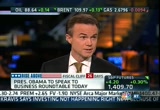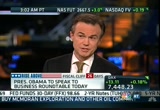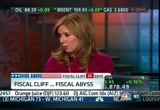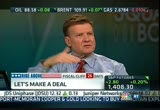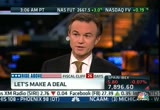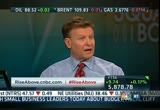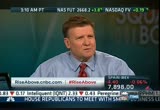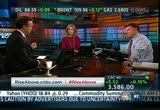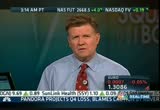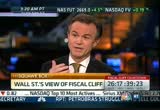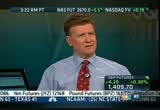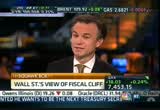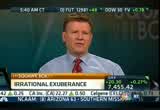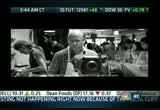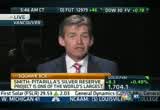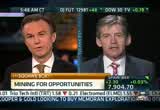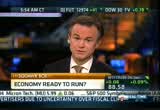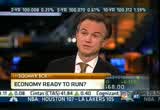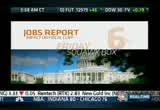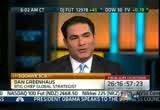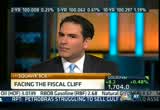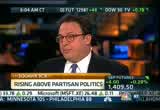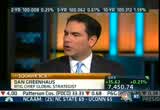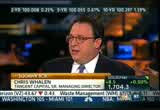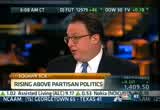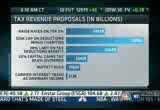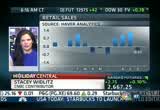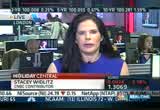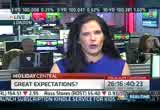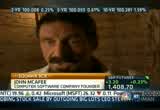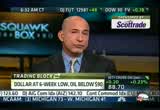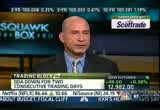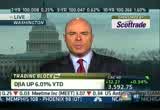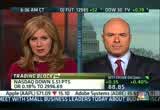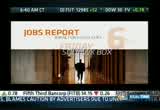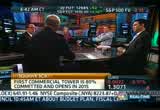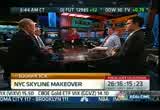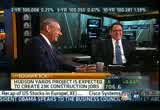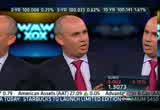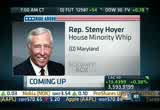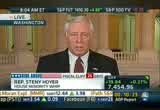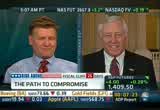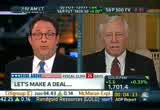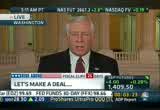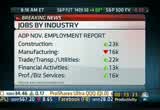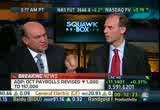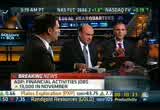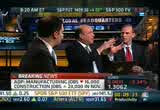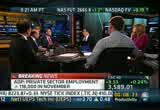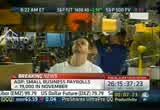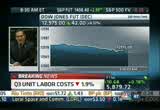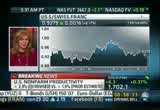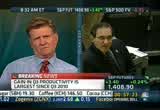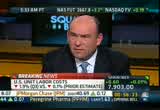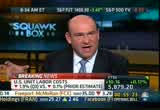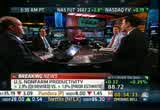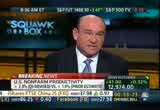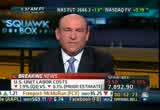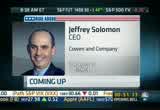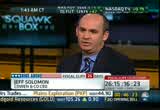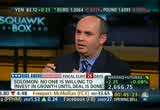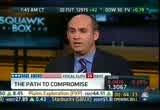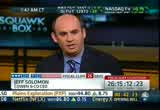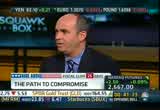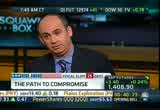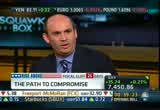tv Squawk Box CNBC December 5, 2012 6:00am-9:00am EST
6:00 am
good morning, everybody. welcome to "squawk box" here on cnbc. i'm becky quick along with joe kernen. andrew ross sorkin is off this week, he's on vacation. our guest, greg. >> great to be here. >> you're very pleased that you're with us here for an hour because we do have a lot to talk about. >> has a lot of experience. >> yes, he does. >> we've got a lot of stories that we'll be talking through this morning, but let's start with that big story that joe was just talking about. president obama speaking to the business round table today, attending to the group's quarterly meeting of ceos. jim mcnerny says including meaningful and comprehensive tax and entitlement reforms. this is the number one story that we've been talking about
6:01 am
every morning here since the election. fiscal cliff, big, big issue. there are now, it seems, growing numbers of people on both the right and the left who would like to see us just go over that fiscal cliff. how big of a problem would that be? >> that would be a big problem. i actually still believe that those -- the democrats, the administration, republicans in the final analysis don't want to see that happen. they do understand that not only would that present a problem in the near term as we went over the cliff at the end of the year, but we still then have the whole debt ceiling fight that would transpire shortly into the new year. the issue isn't simply the negative result of going over the cliff, but it's also that business, consumers, everybody continues to hold back on the uncertainty. and we believe the economy is pretty well positioned potentially in 2013 if we can put this behind us. so i think a lot of what's going on is what you would expect to see in this negotiation, very
6:02 am
public negotiation, which is not the best way to do it. i think at some point, the president and the speaker are going to get in a room and have some very serious dialogue as this gets closer. my view is that both the administration and the republicans would prefer to put a deal together, and the outlines of that are on the table. >> you talk about the cliff or the abyss? we need to separate the two. it would be nice to have like a bridge to that $4 trillion deal that includes entitlement, tax reform. in fact, i don't know why the president isn't talking about that more with the simpson-bowles. >> the president did say that he doesn't think there's anything we can get done. >> as a bridge to that. always talking about the high end. >> actually, joe, i think the administration wants to see a deal come together here. >> for what, the fiscal cliff or the fiscal abyss? >> for both. >> for both. >> so that a down payment -- a
6:03 am
compromise down payment on approximately $4 trillion. i think when you pull it apart, you have about a trillion dollars in discretionary spending that has mostly been agreed upon and you have taxes and the entitlements, the mandatory. >> the entitlements are the sticking point. whoa. did you see that? you think that's funny? >> set that up for you. >> you think that's funny, mac? you do this? look at this. this is booby trapped, man. it won't stay up. which can really be a problem. you can laugh at that. it's okay. nobody's watching. it's 6:00 a.m. that got you going. >> when you look through, i guess the devil is in the details in terms of what you're looking at in spending, cuts, entitlement cuts and with the tax increases, and you're right, both sides have put a plan on the table. they're pretty far apart, but at least now you know there's some
6:04 am
framework for how you get to the middle. what do you think, 1.2 trillion in tax increases? >> i think the exact number is part of the negotiation. i think the administration is looking for as much as a trillion six. the republicans have 800 billion on the table in terms of revenues. i think the deal is in and around the republicans getting real commitment to entitlement reform and reduction. >> that's not there yet. >> no. >> in return for the president getting more of what he wants on the revenue side of the equation and potentially higher rates, which i think he is serious about wanting to be part of. >> sounds like he's doubling down on that. >> even though simpson bowles is 28%. so he just wants to go up there and we may never come back down. >> but joe in the final analysis if we get a deal that is real, this is from a market standpoint and i think from the american public standpoint, we get a deal that is real where the $4 trillion -- the spending cuts, actual spending cuts --
6:05 am
>> did you see the journal today, greg? the lead editorial of the journal shows what those supposed savings are. it's winding down the war, which is already happening. they call it totally mythical numbers, that nothing is actually being done at all. >> "the washington post" did a column on this where they look through some of tim geithner's numbers and it was a little concerning. >> smoke in mirrors. >> goes after the entitlements. >> but this is the deal that's going to happen. the cuts there are going to be real or the republicans won't play. >> right. >> and in return, the revenue side of the equation is going to be more consistent with what the president's looking for. i think he's serious about the rates. >> you can't even guarantee that guys like demint and that wing of the part -- you saw what he said yesterday. >> i didn't see what he said. >> he said no way. 800 billion in tax increases. we're saying it now like it's normal. 25% of gdp for government spending and you've got bloated government already, you start there.
6:06 am
you start at government spending. you don't immediately start spending another 50 billion in stimulus. >> that's going to be the question that boehner has to deal with. the president will have to deal with the far wings of his party. boehner started doing it. did you see they removed two tea party members from the budget committee? >> i don't want to raise taxes to fund 25% of gdp. >> and actually, the american taxpayers are being told to pay their fair share. they want to see real entitlement reform as well. but you have to deal with the issue on the table. i mean, the spending right now is a percentage of gdp is 24%. it's projected to go substantially higher. do you know that medicare and medicaid didn't exist 50 years ago and they're now a quarter of the federal budget? >> i know. it was supposed to be supplemental. david walker was on the other day talking about obama care which is supposed to save us a trillion dollars and the actual cost, what it added the our entitlement is 12 trillion. just that we did in the last two years. or whenever it was. >> but in terms of where we are
6:07 am
now in this negotiation, i believe that both sides in the final analysis want a deal and the compromise is in the revenue side for the president and potentially rates which i think he's serious on and real entitlement reform for the republicans and the american people, markets, business, confidence, the able to move forward in 2013 is all a function of doing both of the things you talk about, joe. having an agreement to avoid the debt, the fiscal cliff, and then having a down payment on actually getting the $4 trillion identified. >> howard dean is a deficit hawk. liberal, but he is a deficit hawk. he doesn't say maybe if we can't get a deal together, maybe we'd be okay with the fiscal cliff. he says that is the best deal for everyone, the best deal for progressives, just to do it. to go back to the clinton era rates. you get rid of three quarters of the deficit just on tax increases at that point. >> and he says you get defense cuts. >> you can't get defense cuts any other way.
6:08 am
and he's not the only one. there's a lot of people on the left and there's quite a few people on the right. i'm glad you're optimistic and a lot of ceos and guys in your position -- if you run a company, you don't need consumers petrified and business people petrified. this is the last thing we need if you run a company. i understand you have a horse in the game. >> but you also have the double trigger. if you go over the cliff, we've got the debt ceiling fight right afterwards. it's not like that's six months down the line. that's in if first month, six weeks of the new year. >> the other thing, depending on where you stand, the idea that we just get rid of congressional approval of the debt ceiling at all, which is that ludicrous proposal that was in the president's plan. that's not -- and would you really want that? would you really want not having any more oversight over whether we keep raising the debt? >> but there's also a compromise that's potentially there on that as well. >> you are all about compromise today. he's a deal maker. you guided that place through the financial.
6:09 am
you sold that company and to bank of america, right? >> i had a lot to do with it. >> you did it, i thought. i thought you said we've got to do this. i'm allowed to say that. you were under fire. you were cool and you did that. >> it was a difficult time. >> it was. >> this negotiation is very important for the country. and so i was going back on the debt ceiling. mitch mcconnell has something out there from the middle of 2011 that's a potential compromise, where you don't have the fight about the debt ceiling every time the president proposes it. congress can with 2/3 override it and the republicans can maybe say they're not happy with the progress or maybe you have triggers along the way so you don't have the debt ceiling fight every time as long as the expense agreement cuts that have been reached are hit along the way. there's a potential compromise on that one as well. it's a very important topic and it's not going to get done if
6:10 am
both side don't walk away. >> neither side can do this by themselves. >> no. >> both of them can go over the cliff. >> but neither side can reach an agreement. >> with real consequence. >> i know. but even howard dean said we might have a recession, but it would be worth it because we'd finally clear the debt. >> i'd like to see some real math. "the washington post" laid out that tim geithner i think is a great guy, but $44 billion in his savings that he found was just because they pushed a payment out at the end of the ten years. they moved the timing. >> volcker put us into a recession. that was fully orchestrated for a reason and there was a lot of pain, but it set up an incredible two decade-period. and i think that's what howard is talking about now. >> it did with hindsight, but you never know. >> you don't. >> but you look at japan, they never did what they needed to do. and here we are, we escaped the
6:11 am
financial crisis and the money market, it looked like it was going to freeze up and the huge fortune 500 companies. we avoided that but we just keep -- it's like we think we're permanently okay from negative situations and i don't know if we are. things happen in this world. it's still tough, right? >> it is. but this is a very important topic. >> you borrow too much and sooner or later austerity is awful. but if you can't just keep the credit card going if your kid has -- if it's 50,000, you don't say here's another 50. i don't want you to tighten your belt. >> that's why in the final analysis i think the administration recognizes that and they're going to -- >> this administration? >> yeah, is going to come to the table on the entitlement cuts that need to happen to make the deal work. >> you were with him a couple days ago, right? >> with some of his top advisers. >> you can't say which one? >> a group -- valerie jarron and neil wallen and i was with group of seven or eight. >> and you walked away from that feeling optimistic that there
6:12 am
will be an agreement reached? >> yes, that the administration wants to reach an agreement. there are things they want. things they know the republicans want. the republicans know the same thing in reverse. >> who's going to get the ambassadorship to russia? you or anna wintour? >> that's not why i was there. i was there because of the importance of the topic to the country, to our clients, to our employees, to everybody. >> can you imagine -- did you see that? >> yes, i did see that. >> whoever doesn't get wasn't, i heard sarah jessica parker. >> i read something about lazarus. >> i'm supporting mark. i don't know, the queen of mean? the prada thing? >> they deserve it, though, over there. let's talk about some know,s that actually have a much happier ending. there is a deal to end the eight-day los angeles port strike. striking harbor clerks reached a
6:13 am
tentative settlement with management with the ports of los angeles in long beach last night. that strike idled most of america's strongest cargo complex. i think the strike originally started on november 27th. if you think it's not a big deal, there's a billion dollars in goods that goes through this port every single day. it's the largest port in the united states and it was affecting not only that port and all of the ships that had been sitting out waiting to get in with those goods. also truckers who come in and bring those good across america. they had been idled, too. it looks like the port is going to be open once again today. also today is expected to be a big day of protests in egypt. this is video that you're looking at right now from cairo's tahrir square earlier this morning. things were quiet when this video was taken, but expected to be much different later on. television stations across the country planned to go dark today, joining a growing list of industries on strike against newly elected president mohamed morsi's power grab. we've seen what he's done over
6:14 am
the last couple of weeks. these protests are in response to several decrees issued by morsi that gives him near absolute power. last night an estimated 10,000 people crowded in the center of alexandria. tens of thousands rallied in tahrir square. and 100,000 demonstrated in front of the presidential palace. and back here in tus, a busy economic calendar. we get the adp employment report, which is -- i don't know whether it's better or worse now. we'll see. >> they're looking at -- oh, private payrolls. >> coming in at 125 in private jobs. >> 79,000 or 80,000, which was closer to the total number. >> we must still be losing government jobs. 8:30 eastern, a revision to third quarter productivity and costs. and then later this morning, a november ism number, but it's nonmanufacturing.
6:15 am
here's a few early stocks to watch. facebook is going to join the fa face the nasdaq indix. pandora media is lowing its fourth quarter guides. they are worried about the fiscal cliff. shares dropped after hours. that's not where they're trading anymore. you can see they're actually down at around $7.70. it's a big haircut. shares of mattress firm also falling sharply. wow. that's like $7. the company giving a dim earnings and revenue outlook, noting lower traffic growth last month. the company sells national mattress brands like seeley and simmons as well as its own exclusive brands. time for the global markets report. ross we ross westgate standing by in london. anna wintour is going to be your
6:16 am
ambassador. nothing will surprise me anymore. you could get sarah jessica parker. i don't know. take your pick. "sex & the city." >> yeah. and you've got me. is that okay? >> kate might be having twins. yeah, go ahead. >> we're getting down to the flat line at the moment. we had a bit of a bounce this morning. european stocks yesterday very flat indeed. about as flat as the pancakes i make. take a look at the european board. we're down just up eight points. the ibex actually down five. very disappointing retail sales out of the eurozone for the month of october. follows a shop revision downwards as well for september. so austerity really biting in. despite some better data out -- well, i say better.
6:17 am
the services pmi final print for the eurozone came in up better than expected, but it's still deeply in contraction territory. so we're firmly in recession here in the eurozone and in the uk as well. we saw services pmi come in weaker than expected. contraction territory for new orders -- this is the british chancellor today. george osbourne will be delivering his autumn statement where he's probably going to say growth isn't strong enough so we're going to not really meet our budget targets as well. all these things coming into play at the moment as we wait for the u.s. session. we did have a good piece of news, though, out of china. the new leadership saying wle do whatever it takes to maintain solid economic growth. the shanghai composite up nearly 3% today. that boosted retail stocks. we also had a spanish bond auction, prefunding for 2013. got nearly the 4.5 billion they wanted. yields in spain. the ten-year did come lower on
6:18 am
that auction, so not a bad result. and bid to cover was okay. so spanish yields slightly higher after that. didn't raise the maximum amount. that's where we stand. it's another cautious day under way in europe. back to you guys. >> might get my haircut like hers, ross. you know, that anna wintour. that bizarre -- do you think you can manage it? >> a page boy. >> you think you carry that one? >> you'd look awful. >> you know what? we're going to do it. >> you're asking these guys to put me -- >> you'd look good in that one from "dumb & dumber." >> yeah. i make that sound. the most annoying -- you want me to do that? >> no, we don't. >> morgan stanley is trying to bolster lending. some advisers are said to have left the firm due to a lack of lending capacity. you didn't bargain for this, did you? we're asking you about your company. is that okay?
6:19 am
>> absolutely. >> greg funding -- we already know he joins us. you did provide investors with an update. >> yes. >> ross, you want to get into this conversation as well? you hear him? >> he's gone. >> he's gone now. our audio guy is drinking or something. what did you tell them? >> i told them that we have a great business in wealth management. we've got 16,800-ish financial advisers. we feel like we're well positioned for growth going forward. we've come through a difficult integration and are still putting enhancements and adding functionality to our technology platform, which is one of the things that our advisers have been concerned about. and we're positioned for growth. so particularly if we get some market in 2013 -- >> that's always the thing. you've got 16,700 retail
6:20 am
brokers. >> financial advisers. >> you really want the fiscal cliff to be settled. i mean, this would be awful for you and your firm and for a lot of americans, too. be for financial advisers to have people paralyzed again. it would be the worst case scenario. >> one of the things i said at the investor conference was that we feel like we can grow our business even if the market backdrop remains cautious, which is how it's been now for transactional activity has been lighter. >> a percentage of assets. >> that's a big part of our growth story. we call it our managed accounts platform. we have $556 billion in managed accounts at morgan stanley wealth management. that's one of our two major growth areas. the second being the lending business, which you talked about earlier. we've been working the last couple years to build our out
6:21 am
banking and lending business. our peers are bigger in that. but as we get more and more of our financial advisers to lend with their clients, we have significant growth there. >> plus you get assets back from citi, too, right? >> we now have an agreement in place where we can buy the last 35% of this joint venture at a time that we choose at a price that's already been agreed. actually, we're fully intending to do that in 2013 subject to regulatory approval. >> so are all the firms -- they're adding these lending -- instead of a home equity loan, if you had a stock portfolio, you could use that as an equity line. >> absolutely. >> is that what you're talking about? >> yes, we're talking about that, we're talking about high net worth lending, securities based lending. it's a significant part. our financial advisers want to have a complete relationship with their clients. so they the a terrific job on the asset side of the client's balance sheet. they also want to help the clients when they have borough
6:22 am
a -- borrowing needs. >> this is throughout the industry. i can see that. that's interesting that retail brokers -- >> i don't understand why that's so much more profitable of a business line. it raises profit margins when you can do things like that. >> it does. you have a significant deposit base. afterwe buy the last 35% of the joint venture from citi, we will have close to 130 billion in deposits in our banks and we take those deposits and we lend them back to our clients and that's good for us, it's good for our clients and it's good for our financial advisers. so it's an important part of the wealth model today. >> you're at 13% right now for the profit margin? >> yes. in the third quarter, our pretext margin was 13%. our target that we've articulated to the street is mid teens by the middle of next year and what i said yesterday is we feel very comfortable that we're on track with that. >> you wanted to make another -- i'm looking at a tweet that came to me, actually. the amt patch has expired for 2012. millions face higher taxes this year unknowing -- so this guy is
6:23 am
thinking you wanted to mention that, too. >> i did. because you were talking about the number of people who now say let's go over the fiscal cliff. both sides have a real vested interest in that not happening. both sides. the republicans in the final analysis give higher taxes. you have the possibility that they're going to be able to be painted as having been the ones to really trigger it. and on the democratic side and the administration side, you have -- without this patch, and the patch is something that's been passed every year since 2001 to inflation adjust who's caught by this alternative minimum tax. if you don't put the patch in place -- and by the way, the patch costs almost 200 billion dollars for the next two years. if you put it in place, that's what the cost of it is. if you don't put it in place, amt catches a lot of middle income. >> at what level? >> it goes all the way down to -- >> i think 70 or $80,000. >> that's where the patch takes you to, well below that. >> does it really?
6:24 am
>> that's going to affect a lot of the democratic constituents. a lot in the blue states where you have high state and local income tax deduction. so you lose that and the alternative minimum income tax kicks in. so you have that on the democratic side and the expiration of the unemployment benefits. both side have a real vested interest. >> would you like just a totally toothless pan kicking exercise down the road would be better than the fiscal cliff? >> that's a tough one. the toothless can kicking exercise is hard. you've all helped make this a significantly watched issue. >> you want a pen? >> i'm happy to have a pen. >> you don't have yours on. >> i forgot. >> i've got mine prominently displayed. >> you forgot a couple days last week. >> we'll get you one. did we finally send them out?
6:25 am
>> i saw some people got them. when we come back, we'll have much more from our guest host today, greg fleming. but first, a new frontier of luxury. [ penélope ] i found the best cafe in the world. nespresso. where i never have to compromise on anything. ♪ where just one touch creates the perfect coffee.
6:26 am
6:28 am
everybody. the dow futures are up about 40 points this morning. s&p 500 are up by more than four and a half points. boeing says that u.s. regulators have ordered the entire fleet of 787 jets to be inspected for a possible fuel line problem. that announcement came the same day that one of the company's new dream liners made an emergency landing because of a mechanical problem. >> our next guest is a pioneer in the luxury hotel world. he once ran ritz-carlton and his latest project is being hailed as the new frontier in the hospitality industry. the chairman and ceo of cappella hotel and resorts joins us now. welcome, it's great to see you. >> thank you. >> can we stay in one of these already? >> sure. caba san lucas. or in singapore. >> and would you say your competitors are ritz-carlton and four seasons? >> not really. ritz-carlton and four seasons
6:29 am
are luxury hotels. so we move into ultraluxury. the guests used to stay in those luxury hotels in the suites. we concentrate only on those guests. >> do i get a butler or something? >> you get anything you want. as long as it's legal and ethical. >> what's not legal in mexico? that's why you put it in cabo, right? thailand -- i'm definitely not going there. i would never come back. >> oh, you wouldn't, even though we are controlled in those areas, you wouldn't want to come back if you go to one of our hotels. >> so you get incredible service with the spas. what else, standard rooms? bigger rooms? >> they're bigger rooms. it's not -- luxury has changed. it's not about a room and the chandeliers and marble. it's about individualizing and
6:30 am
personalized attention. it means we do anything for you. we call you before you arrive in our hotel and we say what do you want? what do you need? if you have a diet, etc., etc. so it's this new demand that the customer has. as a customer myself, traveling 200 days a year, i have no time to wait and come back home to live my life. i have to live it on the road. and we offer that you can live your life in our hotels on the road. >> are your hotels full? >> oh yeah. business is exceptional right now worldwide. because new markets have come into the industry like the chinese traveling, a hotel in bali. now it's not as common anyone. today 20% of our occupancy is mainland chinese. of course it's top market. that has an influence on the whole world in the ultra luxury
6:31 am
business. so businesses create however -- >> china is creating that great demand? >> pardon me? >> china is creating that great demand? >> yeah. the chinese customers. >> aren't margins lower than in an average hotel? you charge more but the services cost more. >> very expensive -- we need to be in a location that we can charge a good price and have high occupancy. otherwise the model doesn't work. >> what's the cheapest room i could get? >> in cairo? >> dominic strauss kahn -- >> in kabul, $800. for christmas, $2,000 a night. >> 2,000? >> for the christmas season, yes. and of course, the rest of year is about $800 a night. but last year, christmas, 64% of our guests rebooked for this year. that means we're giving value. that's what it's all about. that customer wants value by individually reliable attention. and that's what we're doing. business is exceptional. what is not exceptional is
6:32 am
development of new hotels in the u.s. and europe. there's not development the last few years. that is, of course -- that hampers our growth. >> it hampers growth but makes you more -- the ones that are existing would be more dear, wouldn't they? >> exactly. inventory is slowing down. as a company, you need to grow. you need new destination, you need new availability for your guests. we need to have more deals frankly in the u.s. in asia, it's growing all around. construction in bangkok, in japan, in russia, in middle east. we're growing all around, in russia and in china. however, growth is not taking place in the u.s. and europe. and for major developments. >> we talked about back when greg was dealing with the financial crisis. we questioned whether luxury was going to be something to invest in. >> oh, absolutely
6:33 am
unquestionably. >> nothing will change? >> the one thing we have to understand, though, luxury is changing. what you call luxury today, the traditional five-star hotels. they will be known as affordable luxury. and then there's ultra luxury that is developing clearly over the last ten years. >> and it's not just here that there's income disparity. >> everywhere. >> you see really rich people all around the world. >> it's not only rich people. our occupancy is 60%, 70% rich people and the others are up buyers who say i'm going to buy up. >> they're not all like greg fleming. >> he doesn't need to. he just bias it. >> you can just stay in it, christmas season or not. >> because of all the tension that he has with us. >> what about the u.s. economy. you said there's no development, but how is the business on the u.s. for a general basis?
6:34 am
>> occupancies are exceptional. we have a hotel here in new york on fifth avenue. exceptional business. exceptional all around occupancies. we haven't seen anything like it. we rely also on growing. and the customer demands have changed dramatically. and we responded to demand. the luxury market -- 40 years ago, luxury was a big lobby with a glass elevator. then came marble and chandeliers. today it is individualized attention. of course the surrounding has to be right. i cannot give somebody a room for a thousand dollars a night and the surrounding is not right. everything we do must be superior to competition. >> it's cappella. thank you. we appreciate it. when i go in, i hope the guy has an accent like you. i would pay more --
6:35 am
>> if you go in, your life will be enhanced and you will have an accent yourself. >> my life will be enhanced by this. >> now you're selling us illegal crap again. thank you. when we come back, do you remember where you were 16 years ago today? alan greenspan probably does. what he said on december 5th, 1996 and why we are still talking about it today. we'll have that when "squawk box" comes right back. [ male announcer ] at scottrade,
6:36 am
we believe the more you know, the better you trade. so we have ongoing webinars and interactive learning, plus, in-branch seminars at over 500 locations, where our dedicated support teams help you know more so your money can do more. [ rodger ] at scottrade, seven dollar trades are just the start. our teams have the information you want when you need it. it's another reason more investors are saying... [ all ] i'm with scottrade. bp has paid overthe people of bp twenty-threeitment to the gulf. billion dollars to help those affected and to cover cleanup costs. today, the beaches and gulf are open, and many areas are reporting their best tourism seasons in years. and bp's also committed to america. we support nearly 250,000 jobs and invest more here than anywhere else. we're working to fuel america for generations to come. our commitment has never been stronger.
6:37 am
6:38 am
by december 22nd sfx- "sounds of african drum and flute" look who's back. again? it's embarrassing it's embarrassing! we can see you carl. we can totally see you. come on you're better than this...all that prowling around. yeah, you're the king of the jungle. have you thought about going vegan carl? hahaha!! you know folks who save hundreds of dollars by switching to geico sure are happy. how happy are they jimmy? happier than antelope with night-vision goggles. nice! get happy. get geico.
6:39 am
we can see that in the inverse relationship exhibited by price/earnings ratios and the rate of inflation in the past. but how do we know when irrational exuberance has unduly escalated asset values, which then become subject to unexpected and prolonged contractions as they have in japan over the past decade. >> that was alan greenspan back on december 5th, 1996, in his now famous irrational exuberance speech. the dow closed that day at 6,437. the index's closing low during the financial crisis, 6,547. >> it went to 14,000 first. >> it did. >> and if there was irrational exuberance anywhere, we know where it really was. i mean, i love the chairman.
6:40 am
but it was in the bond market. f >> in the bond market. >> that got so irrationally exuberant that we're still dealing with it today. i don't know to ascribe any great insight into the speeches. it's kind of ironic. >> greg fleming is our guest host today. when we read that tease before, you were thinking about to irrational exuberance, too. what did you think about it? >> the data is interesting, because if anything, he was early. >> way early. >> the real irrational exuberance took place in -- remember he dropped rates. >> it was because of the housing buildup. >> but even the tech bubble. he dropped rates in '98 after the russian and the long-term capital crisis and the nasdaq went up i think 40% or more. maybe it was 50, 60, 70 in '99 and you had these internet companies trading at incredible multiples. >> the housing market. you want to talk about something that was really irrationally
6:41 am
exuberant. and i think he did great work, through 90% -- the real rational exuberance, could make the case some of it was engendered by fed policies. do you think it's happening again? >> well, no, i think it's been a pretty cautious market. i mean, as you said, bond market. but that's more in reaction to concern about economy and geopolitical. but one thing i think is true when you look back over the last 20 years, you hear this notion sometimes that this time it's different. remember you're valuing stocks differently during the tech bubble. i remember in 2005 and 2006 so many people thinking that the pockets of liquidity were so broad that the credit cycle could keep going and the reality is when you look back at the size of the credit bubble, that didn't make sense at all with hindsight, nor did the tech bubble.
6:42 am
>> what's different this time? what's different that we're arguing? >> the one thing i think that causes it is the fact that there's so much instantaneous communication everywhere and the whole world is linked so that something that starts to be driven in one direction in one country or one part of the economy can become a global phenomenon as the credit bubble did, where you ended up with subprime mortgages in places that you never could have imagined. and portfolios of governments in northern europe. so i think that's part of the reason why you have a greater prevalence of bubbles development. this time it's different stories. >> but be nervous every time you hear somebody telling you this time it's different. >> it's one of the few good things about getting older. you can look back and say it wasn't different then, it's probably not different the next time you hear it. >> greg fleming again is our guest host. we'll have more from him in just a home. when we come back, the prospects for precious metals. the ceo of silver standard resources will tell us about the
6:43 am
6:44 am
6:46 am
welcome back, everybody. the silver standard resources announcing the results of its second silver project, this one in mexico. the company ceo john smith joins us from vancouver this morning. john, why don't you tell us a little bit about what you found in mexico. >> good morning to you, becky. a large project here, will be producing about 50 million ounces of silver over 18 years and has a life well in excess of 20 years. so large project. going to be a base load supplier for us as a business. and compliments nicely the mine
6:47 am
that we have in argentina. so very strong corner stone project for us, real happy to have it. >> also i think one of the advantages from what i've read about this is that it's at a lower altitude than other silver mines so it's a little easier to access? >> that's right. a lot of silver mines are higher up. this one is lower. it's accessible. so really from a point of view of access, build and production, it's in a great location for us. >> we've seen a lot of interesting moves, if you want to call them interesting, over the last four years or so. silver has done very well. why do you think that is? >> i think it's just now behaving as a precious metal. it can behave as an industrial metal, but now it's a precious metal. hearing you talking earlier on, central banks, if you added up their debt in u.s. dollar terms, it's now $13 trillion compared
6:48 am
to ten years ago, it was about $3 trillion. so that just shows you the magnitude of problems in governments of trying to use austerity. i mean, clearly debasing currencies will be part of the answer to solve this. and then that's why silver will do real well. >> how long do you see that trend continuing? do you think there's a point where the governments around the world actually do get their fiscal house in order and what happens to silver prices after that? if it goes back to just being a production metal. >> clearly at some point that will happen. but when you look at the size of debts, we're talking about how to fund more rath every than dealing with a physical intrinsic debt. but as a construction metal, an industrial metal, it's today's metal. it's highly leveraged towards new technology and medicine and that's one of the great things about good old silver. it really is a performing metal for the good and the bad. >> john, what is the silver market telling you about the
6:49 am
global economy and going forward, maybe in north america, europe versus asia. >> i think what the silver market is telling us, it's an extremely volatile metal and i think today you're seeing that volatility playing out. it sits well over $30 and it's been sitting at well over $30 for long term. but what we're seeing in business is it's being driven by macro behavior by investors. investors are really looking at the u.s. position, and their judgment about what they invest in is very much driven by that. so a lot of money going into the likes of the etf, rather than into equities. there's a huge value gap between equities and the silver metal. ultimately that will get arbitrized. >> we want to thank you for joining us today and congratulations on this new find. >> thank you for having me. still to come on "squawk box," the word of the day from morgan stanley's greg fleming.
6:50 am
and at 7:15 eastern, just 19 days until christmas. we'll bring up the state of retail so far. we'll see if house minority stan hoyer will accept the call to rise above. stay tuned. well, if it isn't mr. margin. mr. margin? don't be modest, bob. you found a better way to pack a bowling ball. that was ups. and who called ups? you did, bob. i just asked a question. it takes a long time to pack a bowling ball. the last guy pitched more ball packers. but you... you consulted ups. you found a better way. that's logistics. that's margin.
6:51 am
find out what else ups knows. i'll do that. you're on a roll. that's funny. i wasn't being funny, bob. i know. or that printing in color had to cost a fortune. nobody said an all-in-one had to be bulky. or that you had to print from your desk. at least, nobody said it to us. introducing the business smart inkjet all-in-one series
6:52 am
6:53 am
6:54 am
could just do this that we're almost spring loaded for what could be pretty good gdp, lower unemployment, higher stock prices, we're ready to go except for this. >> well, i think that there's two aspects of this. one is what will happen if there isn't an agreement. not just the fiscal cliff, all of the other follow ones that we've talked about, amt and having a fight in january, february over the debt ceiling. but there's the other aspect, which i do think positions the economy to do better going forward. and there's a bit of slingshot effect. and that is that the uncertainty markets investors, our clients, our financial advisers, they don't like uncertainty. and companies don't in terms of investment decisions and major capital expenditures. and if we can remove the uncertainty, i think the american economy is better positioned than many foresee. and you hear a lot of that, frankly, you know, from different leaders around the
6:55 am
world. different business executives that the economy here is better. and if we can get through this, not just, again, the specifics of getting through it, but removing the uncertainty is a big thing. >> housing's better, but then, there are people that say the debt is still with us because it was a long period of building. bill gross yesterday said get ready for 2% is what we get. for years into the future based on just recovering. >> you know, there's a famous john kennedy line about looking at the past and present to predict the future. i think it's been a very difficult four or five years in this economy. and because of that, you hear people talk about rates will be at zero through 2018. nobody really knows. >> although the fed is giving us long lead time telling us it's going to be low for years to come. >> they're trying to keep confidence high enough to keep this going. all i'm saying is right now there are these consensus, in the middle of 2009 after the stock market snapped back, there were very, very few people
6:56 am
around thinking rates would be zero in the early 2013. so all the people saying 2% gdp you know, as far as you can see and zero rates for five years, they don't know and the future often tends to be very different -- >> don't you have any ronald reagan quotes? >> you know, in the final analysis, reagan did have tax reform that was very positive for the economy. >> i agree. you know, but you picked the democrat. anyway, it's nice you were able to be here. and you were only allowed to stay until 7:00 because you have to work. >> i have a job. >> you do. >> thanks, greg. when we come back, money on the move with still no deal on the fiscal cliff. plus -- location, location, location. billionaire steven ross talks to "squawk" about breaking ground on some prime real estate in new york city. "squawk box" is coming right back. it's a new day.
6:57 am
if you're a man with low testosterone, you should know that axiron is here. the only underarm treatment for low t. that's right, the one you apply to the underarm. axiron is not for use in women or anyone younger than 18. axiron can transfer to others through direct contact. women, especially those who are or who may become pregnant, and children should avoid contact where axiron is applied as unexpected signs of puberty in children or changes in body hair or increased acne in women may occur. report these signs and symptoms to your doctor if they occur. tell your doctor about all medical conditions and medications. do not use if you have prostate or breast cancer. serious side effects could include increased risk of prostate cancer;
6:58 am
worsening prostate symptoms; decreased sperm count; ankle, feet, or body swelling; enlarged or painful breasts; problems breathing while sleeping; and blood clots in the legs. common side effects include skin redness or irritation where applied, increased red blood cell count, headache, diarrhea, vomiting, and increase in psa. see your doctor, and for a 30-day free trial, go to axiron.com. i heard you guys can ship ground for less than the ups store. that's right. i've learned the only way to get a holiday deal is to camp out. you know we've been open all night. is this a trick to get my spot? [ male announcer ] break from the holiday stress. save on ground shipping at fedex office. it's easy to follow the progress you're making toward all your financial goals. a quick glance, and you can see if you're on track. when the conversation turns to knowing where you stand, turn to us. wells fargo advisors.
7:00 am
negotiations in washington at a stand still. >> there's nothing going on privately that's not going on publicly. >> they've got to come with some specific revenue. they've refused to do that. >> what investors are in for if lawmakers can't reach a deal to avoid the cliff. smart money minds dan greenhouse and chris walen both here with the facts of your financial future. who's up, who's down so far in this holiday shopping season? >> you work on commission, right? >> yes. >> big mistake, big. huge. i have to go shopping now. >> the second hour of "squawk box" begins right now. ♪
7:01 am
good morning, everybody. welcome back to "squawk box" on cnbc. i'm becky quick along with joe kernan who is singing along this morning. >> were you there? >> how do you watch? >> how do you know? >> because i know they were in it. >> our hipster in residence. andrew is off this week. he's on vacation. we've been watching the futures and they are indicated higher. market gave back some ground today. dow down by about 13 points by the end of the day. dow futures up about 36 points. the nasdaq futures also indicated higher. let's get you caught up on your morning headlines. the fiscal cliff, top of mind for wall street this morning. adp out with the monthly look of private sector employment at 8:15 eastern time. economists think this report will show that the united states added 125,000 private sector jobs in november.
7:02 am
president obama's going to be speaking to the business round table today about the ongoing fiscal cliff talks. boeing ceo jim mcnerny says the business leaders want a balanced solution to short and long-term deficit issues. and facebook is joining the nasdaq 100 index. it will be joining the index next wednesday and replaces tech firm emphasis who is moving to the new york stock exchange. our guest host here to take on the financial cliff as well as false assumptions investors may be making about what the markets will do come january. joining us is dan greenhouse and chris walen, senior managing director. just looking through some of your comments, dan, you don't think we should go over, obviously. >> well, we were -- chris and i were joking in the green room. a lot of the policies in the cliff to us personally are
7:03 am
anathema, but that's probably going to happen and what should happen. >> bring it on. >> you think -- >> look, subject americans to the minimum tax. >> yeah, they'll understand. >> the democrats want to raise taxes so they can spend more. they derive economic sustenance from spending. you've got to understand the dynamic. >> you're a libertarian. >> i'm a progressive libertarian. but i think chris brings up -- >> progressive libertarian. paul krugman told me he was a welfare state capitalist. >> oh, no. >> what is that? and you called him a unicorn. >> they don't exist anymore, do they? but apparently he does. >> chris brought up an important point. there's this idea that somehow democrats are the party of fiscal irresponsibility and republicans are the party of fiscal responsibility. it's every bit as bad as --
7:04 am
>> well, philosophically. >> nobody's done bad recently. >> there's a party of low taxes -- >> they're not the party of small government? >> well, the rhetoric sometimes goes away. i agree, they would like to take over the welfare state and run it better, the republicans. only a certain group, the tea party types, the more conservative members of the republican party have said, all right, we lost the battle with fdr. america became a socialist state and the only way we can defend ourselves, our liberties, to be a gorilla force that -- >> well, we had wars. >> we have in the tax code, tax expenditures. that is spending through the tax code. and it picks a favored and connected groups to get preferential tax treatment over others. >> like homeowners. >> like corporations. >> crony capitalism is just as bad -- >> well, it goes back to andrew jackson's veto of the -- what he talked about was people cutting
7:05 am
their own private deals and he's absolutely right. >> and leading arthur brooks, whoever you pick, they make that point. the crony capitalism is just as -- >> it's what democracy does. until it gets so bad. people get so angry, they gain control. shareholders don't really have control of corporations, until they do. and it's the same thing in democracy. >> tell me why i'm wrong about this and i've said it a lot. if you get government to the point where it's 25% of gdp, and you know full well it's bloated and overspending, i don't think you decide how to pay for that. you don't say, okay, i'm going to get the revenue side up. i think you immediately start on the 25. and knowing that both spending cuts and tax increases are both negatives for the economy, why wouldn't you start with -- let's start with cutting back on government. >> well, this is my favorite part of this entire debate, which is we're so focused on
7:06 am
taxes and what percentage -- >> why? we should be focused on growth. >> really at the heart of this conversation is how big do we want the government to be? and this is why sometimes you think i'm more left than i am. because the country has decided we want a larger government than perhaps i'm comfortable with. the reason i joke about democrats being the party of fiscal responsibility because at least they want to pay for it. they're going to take my money to pay for it. >> no, they don't. for 30 years, we've been using various expedience, tax expenditures to keep the growth game going, and now we've run out of runway to such extent we don't have any options like that anymore. so when we look at the fiscal cliff and everything else in terms of actual cuts in spending, everybody recoils in horror because they know it implies. >> you made your point, though, we surrendered to fdr, and instead of supplementing people, instead of letting them earn their own success, we're going to somehow try to deal with outcome rather than opportunity
7:07 am
and pay for it. and you want to pay for -- >> no, i don't. >> in a fairer society. what you see as a fairer society. >> i didn't say it was a fairer society. but chris brought up an important point. and i want people to talk about the "wall street journal" today. we're not talking about cutting spending, not talking about cutting growth rates, which is a huge difference, one reason why people like me look at former presidential candidate mitt romney talk about npr or planned parenthood. the number one answer for balancing the budget is foreign aid. which if you really wanted to balance the budget and you don't always have to go to the department of justice or whatever it may be. but over the next ten years, 90% of federal outlays will be medicare, medicaid, social security, defense spending and interest on the debt. you can wipe everything else out and you'll basically -- >> it's like what you were talking about in the last hour, to rational exuberance. americans want it, want it now, and don't want to pay for it.
7:08 am
there's a certain quality in american democracy that just allows us to be completely self-deluded. >> dan brought up an grinterestg point, the debt. which they're going to go up, at that point, you've got a serious problem on your hands. >> why wouldn't -- as a leader of the free world, why wouldn't you be saying i've got to get these entitlements under control? they're not even talking about it, not addressing it on these sides. >> it bothers me when dick durbin says separate it out while a lot of democrats saying let's deal with it later. which it's a debating standpoint. >> you do that a lot. >> i don't understand why you'd want to separate it out. everybody knows the driver of the debt in the long-term is the entitlement programs. again, from the democratic side of things, you can solve a lot of that by letting the bush tax cuts expire. >> you can, but look, again, all those tax cuts were expedience.
7:09 am
they were meant to forestall social unrest. we've got to keep the sled moving at a certain growth rate. and we've done that for 30 years. now you're at the point where you really can't push it anymore and you're faced once again with cuts. as becky was saying, if we actually paid for debt right now. if the fed wasn't giving us a pass, we'd be in a much different situation. >> when did democrats fall in love with the bush tax cuts for the lower 98%. >> this is an important topic that i'm talking about with clients right now. i think everybody's looking at the president. he gave an interview with bloomberg news and he talked about, i want the tax cuts to go away. not because i hate success or want to punish rich people. this is a president who seems focused on curbing the growth and income inequality and a lot of the -- >> it took you six years to see that? >> took you five years to see that? >> the rich people he's talking about are small businessmen. >> the democrats smack that down -- >> the way you define as the
7:10 am
president says, the way you define small business, he is a small business. >> he certainly is. >> it's something like 3%. >> 3% -- 54% of the revenues. >> because it depends how you define a small business. >> i'm telling you, you let this go forward, those are all going to be republicans two years from now. thank you very much. i think grover norquist will be laughing at all of you. >> all of who? >> you don't solve income inequality by taxing rich people. that doesn't happen. >> i'm just advancing -- >> you don't think the republicans will bear a big part of the blame on this? the president has set it up like that. we want to both keep taxes low on 98%, what can't we -- >> they can spin it any way they want and they will, becky. but i think the key thing here is that neither side is really moving the ball forward. they're not really talking about core issues when it comes to any kind of fiscal sanity. but i will say this, part of the
7:11 am
reason the republicans are so reluctant to do business with obama is they got rolled in the first two years. and the other thing is when they hear the rhetoric coming from the left, listen to people like paul krugman who says we've got to print money and borrow money. they're horrified. you take that message down south to a lot of constituencies and they don't want to deal with. so, you know, i think it's a strange time. we do have great polarization, but you're not going to convince the tea party types that the grow through more debt route is a good plan. they're never going to embrace that. >> but john boehner yesterday moved two tea party people off the budget committee. >> he better be careful because he could get fired very easily. >> i saw yesterday on twitter already there was a fire boehner -- >> he almost got fired last year. >> he's been on the bubble for some time now. although, i'm under the impression and reporting has suggested that the relationship between the two camps has gotten better. but clearly if you're eric cantor, why wouldn't you want to
7:12 am
be speaker of the house? >> all right. >> all right. you guys are -- were you okay in the green room? nobody separated you two, did they? it was a civil? >> no, we get along. >> in the green room -- >> any bagels in there for you guys? >> no, we don't eat bagels. >> guys on monday got bagels. >> the bagels were there? >> it's all good. >> i judge what we think -- >> i'm jewish, when i walk into a room, i immediately know if there are bagels. >> did you get a tree? >> a holiday tree? >> yeah. >> you do? >> my wife says no, they're too messy. >> the christmas tree is the celebration of saturn, anybody could have a christmas tree. >> did you get a festivus pole? >> now you're talking. >> this is a family show. >> it's early. >> thank you very much, dan. we appreciate it. chris is sticking around. up next, we are half way through the holiday shopping season.
7:13 am
we're going to look at the winners and losers after this. and 7:40 eastern time, steven ross, looking to revitalize a major area of new york. we're going to talk business and football when he joins us in a few minutes. drum and flute" can look who's back. again? it's embarrassing it's embarrassing! we can see you carl. we can totally see you. come on you're better than this...all that prowling around. yeah, you're the king of the jungle. have you thought about going vegan carl? hahaha!! you know folks who save hundreds of dollars by switching to geico sure are happy. how happy are they jimmy? happier than antelope with night-vision goggles. nice! get happy. get geico. fifteen minutes could save you fifteen percent or more.
7:16 am
♪ welcome back, everybody. we are just about half way through the holiday shopping season. so which retailers are bringing in the bucks? president at sw retail advisers and a cnbc contributor. and stacy, there's been some interesting talk. we assumed that things got off to a really good start. and then yesterday, all of a sudden, people were kind of reassessing how the holiday shopping season is going so far. we know that those november retail sales reflected sandy and some other one-time issues. what do you think really is happening behind the scenes in terms of what's happening for holiday shopping? >> well, i think it's the same story every year. the promotions start early, black friday's always a big weekend, this year was no different, and it depends on who
7:17 am
you listen to nrf was very optimistic about the estimates, gallup was not so much, and then the sandy-related numbers. there are clear winners and losers here. it's the sandy blameathon, clearly, but some of the winners and losers walmart and limited. >> walmart and limited. who do you think is in trouble. we saw gap shares down by 7%. is that a reflection of the dividend they won't be paying or the special dividend. is there something more with what's going on with stores there? >> well, i think everybody's nervous now, certainly. again, after you saw the tough numbers in november, the question is, do retailers get nervous? do they press the pedal in terms of more and more promotions? gap yesterday was very much related to the potential of their dividend coming out which, you know, sounds like it's not going to happen. so that was certainly
7:18 am
responsible for a lot of the weakness in the stock. but certainly in retail, you're looking at who's getting more promotional as we get closer to christmas. we know that the consumer procrastinates. we have two extra days this year between thanksgiving and christmas. so are retailers going to get extra nervous and really try to gain that market share at the cost of margins? >> you know, everywhere i go, though, i have to admit, i've been out in the malls recently and everywhere i go, i see sales. should i be worried about every single retailer? >> no, sales are certainly a lot of them are preplanned for most of retailers. i think in the next couple of weeks, you really want to watch certain retailers and say is it getting worse? are you seeing those clearance promotions? are you seeing 50% off. is your e-mail inbox filling up with free shipping, free gift wrapping and all sorts of extra freebies, and then you want to get concerned. but the next couple of weeks is a bit of a lull after black friday. the question is, did consumers spend a bigger portion of their dollars this holiday on those
7:19 am
big bargains over black friday. >> hey, stacy, hi, dan greenhaus here, there's been growing concern about the upper income consumer and the retailers that target them. are you seeing any shift over the last couple of weeks and through the holiday season in terms of those specific retailers? >> not really. i mean, we've recently heard from tiffany. and certainly they're talking a little bit about the high end of their business performing better than the silver part of the business. but in general, i think, you know, it's no secret that the asian consumer is slowing down and a lot of these luxury brands get about 40% of their business in europe and in the united states from that consumer traveling. so the question is, does that slow down next? but, you know, really it's -- i haven't seen any change out in the market. >> you know, stacey, you mentioned we should be concerned about some of those where we are seeing sales that weren't planned. who in particular should we worry about? >> well, i think you want to watch out for the teen space.
7:20 am
so that's always one that gets very competitive, certainly american eagle's been outperforming, aeropostal, so you want to watch for extra promotions and then the problem is, does everybody feel compelled to pile on and match the pricing? so, again, you know, this year a big theme is price matching whether it's best buy or apparel retailers. everybody wants to know they're getting the best value. last year it was free shipping, now you add in price matching plus, you know, other freebies and you're just getting a lower overall gross margin in the market. >> for people looking at retail stocks, you'd tell them to stay away for most of them? any of them you'd like beyond limited? >> well, i think look at what target is doing. so you have this lull for the two-week period before black friday and thanksgiving. they did a collaboration with neiman marcus, with a lot of designer gifts for under $100. they launched it over the weekend and it wasn't a sellout.
7:21 am
that is something differented that's going to get the consumers in the stores during that lull period. other retailers are not thinking out of the box during this period. so i think, you know, that's one to watch. especially after a disappointing november comp number. >> okay. stacey, thank you very much for joining us today. >> thanks, becky. when we come back, how are you playing the gold market with prices at their lowest levels in a month? is now the time to get in? we'll find out after this. our friends at yahoo putting together an interesting list of top search coupons for 2012. number one, is dick sporting goods followed up by kohl's, grocery coupons, and don't tell ron johnson or bill ackman, but jc penney rounded out the top four. tomorrow on "squawk box," negotiating a deal on the fiscal cliff. we'll talk about possible paths to a compromise with our guest host former treasury secretary larry summers. plus, the ceo of caterpillar
7:22 am
will give us the business perspective on the deficit disaster. you can't afford to miss "squawk box" tomorrow starting at 6:00 a.m. eastern. if you think running a restaurant is hard, try running four. fortunately we've got ink. it gives us 5x the rewards on our internet, phone charges and cable, plus at office supply stores. rewards we put right back into our business. this is the only thing we've ever wanted to do and ink helps us do it. make your mark with ink from chase. tdd#: 1-800-345-2550 this morning, i'm going to trade in hong kong.
7:23 am
tdd#: 1-800-345-2550 after that, it's on to germany. tdd#: 1-800-345-2550 then tonight, i'm trading 9500 miles away in japan. tdd#: 1-800-345-2550 with the new global account from schwab, tdd#: 1-800-345-2550 i hunt down opportunities around the world tdd#: 1-800-345-2550 as if i'm right there. tdd#: 1-800-345-2550 and i'm in total control because i can trade tdd#: 1-800-345-2550 directly online in 12 markets in their local currencies.
7:24 am
tdd#: 1-800-345-2550 i use their global research to get an edge. tdd#: 1-800-345-2550 their equity ratings show me how schwab tdd#: 1-800-345-2550 rates specific foreign stocks tdd#: 1-800-345-2550 based on things like fundamentals, momentum and risk. tdd#: 1-800-345-2550 and i also have access to independent tdd#: 1-800-345-2550 firms like ned davis research tdd#: 1-800-345-2550 and economist intelligence unit. tdd#: 1-800-345-2550 plus, i can talk to their global specialists 24/7. tdd#: 1-800-345-2550 and trade in my global account commission-free tdd#: 1-800-345-2550 through march 2013. tdd#: 1-800-345-2550 best part... no jet lag. tdd#: 1-800-345-2550 call 1-866-506-9616 tdd#: 1-800-345-2550 and a global specialist tdd#: 1-800-345-2550 will help you get started today.
7:25 am
welcome back. st. louis, i think. checking the futures right now -- >> or underneath the mcdonald's. >> under a really big mcdonald's sign. indicated up about 46 points today. and we're still below 13,000 on the dow. and we've, you know, really haven't had -- since the election, things have -- people are waiting. they're either selling because of capital gains or uncertainty or whatever, we haven't made much headway. new video today of antivirus software pioneer jon mcafee. he's wanted for questioning in belize. he's now in guatemala looking for refuge. after smuggling his girlfriend across the border, he plans to seek political asylum there.
7:26 am
>> political asylum? >> police do not have a good track record of providing safety when they ask to question you. so i felt more secure crossing the border into a country that had laws that were backed by the justice system. >> bizarre story. the whole thing with him. who was that last guy? the guy that had the dungeon built in his house? >> yeah, the guy in california, he was a software guy too. >> crazy. money goes to -- i don't know what happened to this guy. but his neighbors did. he had nothing to do with -- >> he had been blogging about -- >> bath salts or something? not to soak his feet in. >> no, bath salts were like a great experimental drug he'd been experimenting with. >> wait a second -- hopefully you don't turn into a cannibal. you draw the line right before you start eating someone. >> hopefully. still to come, rising above the fiscal cliff, steny hoyer is going to be our guest. plus -- and steny, i was reading his stuff. he sounds -- he's rising above a little bit.
7:27 am
he didn't sound quite as -- jobs in focus. private payroll data from adp. this was my choice too. kenny chesney. it's a jobs friday preview. and mark zandi of moody's joins us. we'll explain why he's wrong. >> if you have any comments or questions about anything you see here on "squawk," e-mail us at squa squawk@cnbc.com. markets that are on the move and where you should put your money to work right now. trading block right after this. then a little later, a makeover. we'll have more on that. "squawk" will be right back. having you ship my gifts couldn't be easier.
7:28 am
well, having a ton of locations doesn't hurt. and a santa to boot! [ chuckles ] right, baby. oh, sir. that is a customer. oh...sorry about that. [ male announcer ] break from the holiday stress. fedex office. heartburn symptoms causedelieve by acid reflux disease. [ male announcer ] break from the holiday stress. osteoporosis-related bone fractures and low magnesium levels have been seen with nexium. possible side effects include headache, diarrhea, and abdominal pain. other serious stomach conditions may still exist. talk to your doctor about nexium. time for citi price rewind. because your daughter really wants that pink castle thing. and you really don't want to pay more than you have to. only citi price rewind automatically searches for the lowest price. and if it finds one, you get refunded the difference. just use your citi card and register your purchase online.
7:29 am
7:30 am
7:31 am
and the european union has fined tv and computer monitor makers about $2 billion saying those companies fixed monitor tube prices for a decade which ended in 2006 talking about companies like philips, lg, and panasonic among the companies fined. philips, which was assessed the biggest chunk of the penalty says it will appeal the ruling. and mortgage applications rose 4.5% last week according to new figures from the mortgage bankers association. most of the increase was accounted for by a rise in refinancing activity. all right. the dollar hitting a six-week low on uncertainty about whether a budget deal would be reached. meantime, oil continues to trade below $90 a barrel. joining us this morning, chief market strategist at worldwide markets. also kevin book who is managing director at clear view energy partners. and joe, let's start off talking about the dollar. i can't make heads or tails of why the dollar is under so much pressure. i know things are bad here, we're worried about the fiscal
7:32 am
cliff. but look at what's happening in europe and it doesn't really create a whole lot of feeling about why it should be at these levels. >> the dollar has been reactive. the dollar and euro have been reactive for four years now. to almost the same stimulus, the same motivation for the traders. and that's whether people need safe haven, whether they need to move to treasuries and other things. and it's the same issue here. when things look bad in the summer. when spanish rates are up about 7.6%, then everyone is fleeing to the dollar. you get a lot of long dollar positions in the currency markets. and all that happens is when that subsides, then those positions are unwound. you're not really looking at a new trend here. you're not seeing something that has changed traders' minds about whether the dollar is getting better, whether the u.s. economy's getting better. it's just a reaction back and forth. and that's why when you look at it and say, well, okay, we're here, but why are we here? that's the only reason. a lot of it is internal
7:33 am
positioning in the market. after all, traders have to make money, traders need to trade. they need to have a logic behind what they're doing. and the most effective positioning has been for and against safety. and that's really -- >> short-term stuff. >> short-term stuff. as soon as the position changes, as soon as the motivation, as soon as the facts change in the famous quote. and they'll do it all over again. until there is a trend here. the general, the standard traditional drivers of the markets interest rates, economic growth are not really operating right now. so you're back to this. >> so if there's a solution on the fiscal cliff then, what happens to the euro? >> you will get some improvement, i think, in the dollar, you could. on the other hand, the fiscal cliff is another one of those worries. and the worries tend to go to the dollar. so i'm not 100% sure that if you get the solution, which we all
7:34 am
expect and which the markets expect. everyone expects they're going to do something. whether or not it fixes the long-term problem is an easy question to answer, no, of course, it won't. you could easily get a move away -- i mean a move to the dollar if we go over the fiscal cliff simply because that's going to create all sorts of worries around the world. >> and also because of the austerity measures. >> that's true, as well. the u.s. economy is still the driver of the world economy, still the biggest economy. if you're going to look for something to happen, look for consumers to come back and move and get production generated, it's going to be here, not somewhere else. so if the u.s. puts in austerity as you say, then that is going to drag on the economies around the rest of the world. and you're looking at, i think, more concerns, and that could go back to the dollar, surprisingly. >> kevin, why don't we talk about oil prices? we did see oil touch above $90 last week at the end of the week. but it was a very brief move, this morning back down around
7:35 am
$88. what's driving things right now? is it geopolitical or more of a story about what's happening in economies around the world? >> merry fiscal cliff-mas to you. you're going to see more bouncing like a yo yo, on the fundamental story, the models we have pointing going into 1q, the reason, it sort of rhymes in the spirit of the season. you have non-opec demand growing, global demand slowing, it's not snowing, and down is where we're going. the next big data point is probably the iaea report in february. and if that implicates more progress toward an iranian bomb, there's significant risk to look to the upside. in the meantime, you have a lot of other issues beyond the fiscal cliff. debt ceiling issues, if not resolved in the negotiation looming. and relatively long stocks here in the u.s. perhaps the most interesting part, becky, is to look at the
7:36 am
convergence between light and heavy grades here in north america. we have a lot of light oil. and we're actually potentially short of heavy oil. so seeing convergence within that downward trend means there could be a bid for heavier. >> you would guess that would certainly hurt demand. >> sure. offsetting weakness in the dollar would lift the crude price based on historical trends, of course. yeah, it would be a significant blow, and when we're looking at 370 plus barrels of commercial inventories, folks are going to freak out. at the end of the year is a de-stocking time. clean your inventories if you can, clean your books. perfect reason to sell and with the holidays coming, headed over the cliff would be significantly bearish and probably look a lot like first quarter 2007. the kind of thing that would give you bearish tremers.
7:37 am
>> one thing at simpson/bowles. it seems washington's kind of gotten far away from that, one thing would be a 15-cent increase -- tax on gas. what would that do just to gas and crude prices overall? would that have some sort of a temporary blip in terms of whether that affected demand? >> well, yeah. u.s. demand for gasoline has been trending down continuously since 2007. and really what you're going to do is introduce even more reason for conservation. and probably hasten on a relatively slight basis the already uptrend in efficiency that we're seeing as a result of cafe standards and new vehicle trends. so what do you get? it's weaker demand, the world's growing fast, though. >> okay. kevin, thank you very much and joe thank you for coming into the studio. thank you, both. >> you're welcome. i'm here every day. a new neighborhood from manhattan, the related company breaking ground on the 26-acre site on the west side yesterday.
7:38 am
chairman and miami dolphins owner, dolphins better than the beginning of the season. stephen ross joins us, he's smiling, next to discuss the plans. the futures are indicated higher. we've got that going for us, which is nice, "squawk box" will be right back. [ male announcer ] at scottrade, we believe the more you know, the better you trade. so we have ongoing webinars and interactive learning, plus, in-branch seminars at over 500 locations, where our dedicated support teams help you know more so your money can do more. [ rodger ] at scottrade, seven dollar trades are just the start. our teams have the information you want a
7:39 am
7:40 am
7:41 am
. after a decade in the making, construction on hudson yards, new york city's largest privately funded project since rockefeller center is officially underway. stephen ross is one of the co-developers of the site. stephen, good morning. how long -- you're eventually going to leave as ceo, right? >> i hope not. >> never? >> they'll drag me out. >> they'll drag you out. tell us about the project. >> welm, the project is roughly 300 million square feet. maybe the largest in this
7:42 am
country as one single project and it'll take probably 11, 12 years to do it. yesterday, we broke ground on the first tower and which is roughly 1,700,000 square feet where we have coach and two other tenants roughly for about 80% of the building is committed, you know, at this point. but what's really -- it's really the start of really creating what i think will be the new heart of new york. you can see the shift going on there. you have $4 billion of public money being spent right around the hudson yards. and when you see that type of, you know, capital investment by the government, you know that this is something important's going to happen there. and with extension of the first extension of the subway in over 60 years in new york -- >> all the way out to the west side, which is a big deal too. >> pardon? >> the subway going all the way out -- >> yeah. it really connects it to grand
7:43 am
central, two stops away and penn station. so it's right in the heart of the city. and then you have with the high line, we all know the impact of that. and the expansion of the hudson boulevard that's being built. all these things coming toget r together, and this is where people want to be today in chelsea. i mean, you know when we go out and night and all the new restaurants and activity going, it's all in that area. so i think this will really become the new heart. it'll be kind of a shift. and it's exciting because people said it wouldn't happen. and the vision of the bloomberg administration was -- they were right on target. >> so city government was on your side here. i think of all the things that stand in the way of projects like this, whether it's regulatory issues or zoning issues or labor problems, or credit not being available or the fiscal cliff, any -- i mean it's -- and it's happening. so none of those things stood in
7:44 am
your way? they make it more difficult? >> i mean, look -- doing a job this size in these times certainly -- >> took a while. >> right. >> how long you been working on it? >> well, we were selected in, actually, i think 2008, 2007 just before -- >> yeah. >> before the recession. and so it took time, you know, and people were skeptical at that time about it happening because they didn't know if the subway would actually be built here it'll open in 2014. and it'll be built before any of the tenants are there, which doesn't usually happen in these jobs. but really happened because new york really worked together. it really shows where the city wants to do something. you can't do a project of this size with having really the city behind you. and working together. and it really shows what new yorkers can do when they do work together and what they can accomplish. and i think the bloomberg administration has really done that. >> the one good thing about it is, it's an infrastructure sort of partnership with government, but it's infrastructure that you
7:45 am
might actually use instead of a high-speed rail between -- i don't know, st. louis and -- >> it wasn't just spending money. >> that's what i mean. that's what worries me about -- this actually probably is going to make sense and make money and it's not going to be a boondoggle. >> it's needed for new york for the future. here the city is growing and there's really no area that you really can grow in the city. and that's why i think it's such an important project. because it shows new york can stay the world's greatest city. >> talk to me about the overall capacity utilization equation in new york. because uptown east side is relatively less desirable now than downtown chelsea. you're going to put a lot more capacity into the equation. what do we do with the office buildings up on the east side 3rd avenue that are half empty now? >> right now, i don't think the buildings are half empty. >> i'm nine west, it's more than half empty. >> that's because of the
7:46 am
landlord. >> god bless him. >> that's different. people would love to be there. it's a great building, great views, other reasons why. but i think -- >> the landlord -- >> oh. >> it's incredible. the real estate market in new york is probably the best in the world, you know. owning real estate in new york, the cap rates are lower than anywhere else, maybe other than london. it's a place where people want to be. and that's what real estate's all about. >> that seems to be the bloomberg strategy, put as much retail capacity on the streets and the buildings. >> 16 ounce or less. >> exactly. >> but if you talk to people in the real estate business and the retailers, new york is underretailed. and, you know, for the amount of people and the amount of tourism that comes in there and their sales per square foot, they're higher than anywhere else in the country. and so -- i don't think -- this is a need for new york for the future of new york. >> was there any problem with
7:47 am
air rights in terms of the heights of the building? >> well, the buildings would be very high, very tall i should say. there's a lot of open space. half -- this is on about 28 acres, and half of the space has to be open, would be open with parks, creating great iconic public art we're putting in there. the finishes and details going into this, i don't think there'll ever be a mix use project quite like this. all in the hands of one developer and building it. and we want to do something that's great. >> you know, stephen, you have worked closely with the bloomberg administration, he's in his third term now, when that's over, you're going to see a new mayor come in. this is a long-term project that will last beyond his term. do you worry about what happens next? >> i think you always do. i think that new york is new york, you know, it's survived a lot. i think there's some, you know, candidates out there that i think will be good for the city, hopefully. and people always question that, you know, when there's
7:48 am
uncertainty. but i think he's laid the ground work for new york to continue to grow and i think that's the important thing that this administration has really accomplished. >> so ask everyone about washington, what's going on there. i could say fiscal cliff, but even i'm getting tired of it. what about what goes on in washington? in the back of your mind, did it have anything to do with? >> as real estate, we're just a byproduct of the economy. and people, there's so much uncertainty out there today, and people aren't going to make major long-term decisions until they know what's really going on. so i think it drives everything today, you know, what's going on in washington and, you know, with this fiscal cliff and, you know, what the impact will be of it. >> well, it's an important point. how is the project funded? where did you source the funding for the development? >> that's one of today's challenges. you don't get to the same costs you would typically get them.
7:49 am
it requires more equity and piecing together the banks to put together a loan of the size needed for this. probably our greatest challenge would be -- because we're looking to build. this is only 1,700,000 square feet, in the first phase 6 1/2 million, where's the rest of the capacity to come from for the construction loans that we need? >> the banks were the first source? >> yeah. >> and we're looking at other sources going forward that are kind of unconventional. you have to think outside the box. >> oh, definitely. >> in order to do a job like this today. >> what kind of unconventional sources? >> well, you have a lot of these public reits, you know, that are looking for greater yields, so it's the whole period, i don't know how you do construction financing. i think it's changing, hopefully goes back to where it was before because it makes more sense. you've got to think outside the box. we had that same issue with time warner center when we built that. >> building off the warren
7:50 am
buffett op-ed for a moment here, was there ever a moment when you were debating doing this that you worried either how you were going to -- what tax rate you were going to pay personally on your ordinary income tax rates or capital gains tax rates that you may be subject to. where this was less attractive -- more today than tomorrow? >> no, not from that standpoint. you know, you're developing real estate. certain benefits in doing that, and if you're successful, i don't mind paying taxes and certainly as little as we have to. but the standpoint, really the supply/demand, what was good for new york and transforming it. you get into real estate, sure, everybody, any business you want to be successful. but here you know you're making an impact. >> would you rather raise marginal rates or get rid of the mortgage deduction? >> raise marginal rates. >> what about the mortgage deduction on second homes? >> well, it doesn't exist today.
7:51 am
so, you know, i don't think that's going to have an impact. >> i guess you don't have a second home. >> i don't have a first home. >> the mortgage deduction, you think that would really affect housing overall. >> i think it'll be helpful. it'll be detrimental. >> you'd make it progressive. >> i'm more concerned about limiting the state and city tax deduction. that'll have a bigger impact on the cities and how we do business, i think. >> all right. steve, no dolphins -- i thought dolphins -- how many games did you lose? >> well, we've lost seven games. >> you won a few good games. >> at the end of the day, you're in the business to win. you don't like being under 5-7 isn't exactly -- >> have you talked to woody? >> woody is one guy who will make me feel better. >> new york is a lousy place if you're not winning.
7:52 am
>> to stink. >> any place is a lousy place if you're not winning. >> exactly, in january i'd rather be losing in miami than in new york. >> that's because you don't own the team. >> thank you very much. >> thank you. pleasure being here. when we come back. we have a lot still to come. steny hoyer on the fiscal cliff talks. then at 8:15 eastern, we have the adp numbers. mark zandi is here to talk through the market reaction. 8:40 eastern, jeffrey solomon will be stopping by. or that printing in color had to cost a fortune. nobody said an all-in-one had to be bulky. or that you had to print from your desk. at least, nobody said it to us. introducing the business smart inkjet all-in-one series from brother.
7:53 am
easy to use. it's the ultimate combination of speed, small size, and low-cost printing. how they'll live tomorrow. for more than 116 years, ameriprise financial has worked for their clients' futures. helping millions of americans retire on their terms. when they want. where they want. doing what they want. ameriprise. the strength of a leader in retirement planning. the heart of 10,000 advisors working with you one-to-one. together for your future. ♪ bp has paid overthe people of bp twenty-threeitment to the gulf. billion dollars together for your future. to help those affected and to cover cleanup costs. today, the beaches and gulf are open, and many areas are reporting their best tourism seasons in years. and bp's also committed to america. we support nearly 250,000 jobs
7:54 am
7:55 am
okay. >> take a look at some stocks to watch. i'll look into this pandora. i don't know how it works, but people swear by it. it's down $1.73 today, down to $7.72. above expectations, also revenue, but then the outlook for the current quarter was well below street estimates. and according to the ceo, guy named joe kennedy, pandora's advertiser displaying caution about ad spending also citing
7:56 am
prohibition because of the fiscal cliff and economic -- not really. >> you should try spotify, it's better. >> is it? >> great. 17 million albums, you have a lot of stuff to listen to. >> we have a sell on pandora. >> spodify changed that model. the original model was like a radio station, you would tune into different kinds of music, the spodify is by album. you find what you want to listen to. >> facebook's going to be added to the nasdaq 100, and we talked about these mattress firms also. one lowered -- very volatile, lowered full year earnings estimates and going to be a big loser. you can see -- that's weird, it says 30.32. when we come back, steny hoyer. plus, the number of the morning, private payroll data from adp. mark zandi with will be with us. drum and flute" n
7:57 am
look who's back. again? it's embarrassing it's embarrassing! we can see you carl. we can totally see you. come on you're better than this...all that prowling around. yeah, you're the king of the jungle. have you thought about going vegan carl? hahaha!! you know folks who save hundreds of dollars by switching to geico sure are happy. how happy are they jimmy? happier than antelope with night-vision goggles. nice! get happy. get geico. fifteen minutes could save you fifteen percent or more. can i help you?
7:59 am
i heard you guys can ship ground for less than the ups store. that's right. i've learned the only way to get a holiday deal is to camp out. you know we've been open all night. is this a trick to get my spot? [ male announcer ] break from the holiday stress. save on grounipping at fedex office. the path to fiscal compromise, we'll ask steny hoyer how both sides can rise above to get a deal on debt. >> you're right, charlie, i can't understand why -- and we'll ask the ceo of
8:00 am
cowan & company how the fiscal cliff is affecting his business. >> i'm going down. and breaking economic data -- we'll get an early read on friday's employment report with the adp private payroll numbers at 8:15 a.m. eastern as the third hour of "squawk box" begins right now. ♪ i never dreamed i would climb over the moon in ecstasy ♪ ♪ i've got a golden ticket >> welcome back to "squawk box" here on cnbc. first in business worldwide. a lot of voices around the table this morning. we've got a packed show. i'm becky quick along with joe kernan. joining us onset, dan greenhaus, chief global strategist at bgit. and as i mentioned, we have a big lineup for this house, steny hoyer will be joining us in a moment to talk about the path to
8:01 am
fiscal compromise. at 8:15 eastern time, we'll get the unemployment numbers, economists are expecting an increase of 125,000 private sector jobs in november. in the back half of the hour, we'll talk about the impact of fiscal cliff on the businesses and the market. jeff solomon is the ceo of cowan and company. but before we get to all that, joe has your morning headlines. president obama's going to speak to the business round table today about the ongoing fiscal cliff talks. boeing ceo jim mcnearney says members want a balanced solution in debt issues, including meaningful and comprehensive tax and entitlement reforms. well, you're not going to get that. anyway -- sorry, jim. we're going to be watching facebook stock today. the company will join the nasdaq -- got to watch it. i'm trying to rise. trying. the nasdaq 100 -- >> sinking, sinking -- >> like a snake.
8:02 am
replaces tech firm emphasis, which is moving the listing to the big board. and let's get a check on the markets which are indicated higher today up about 50 points. overseas, let's check out asia and europe. there's a -- .4%. >> had a big move. >> yeah. big move on the hang seng and green arrows everywhere. let's check out europe quickly. also fractional gains there, up about a third of a point each. steny hoyer is striking a conciliatory tone saying both sides will need to bend to avoid the fiscal cliff. congressman hoyer joins us from washington with more this morning, and sir, it's great to see you. leader hoyer, i think you are the first person we've heard from who is making this sound like we have hope for reaching some sort of a compromise. how do you see the path to getting to that compromise? >> well, i think it's very tough and obviously that's why we haven't made progress today. all i said yesterday was what mcnerney, bowles/simpson have
8:03 am
said, we need a balanced package and we need to all come to the table honestly. realizing we have differences of opinion. but also realizing this is a math problem. it shouldn't be a philosophical problem or ideological problem, it's a math problem. we have to get america on a fiscally sustainable path. and in order to do that, we'll have to have a balanced package. we'll have to look at additional revenues. we're now essentially as i put it pricing our product at $15 while cost is $22 to produce or $23 to produce. that math doesn't work. so we're going to have to sit down together and, unfortunately, that really hasn't been happening. very frankly, the president's put a lot of details on the table in his budget. i have a graph that shows a long list of details the president's put on the table. and the other day in a short letter, the republicans put on some -- i don't criticize them
8:04 am
for that, but they need to fill in the details. we need to know what they're proposing specifically in revenues and in cuts in order for us to get to an honest discussion of where we are. >> congressman hoyer, i agree with you, there needs to be honesty with some of these numbers. the "washington post" yesterday took on tim geithner's numbers and pointed out that a lot of the numbers that are in his proposal, in terms of $600 billion in terms of spending cuts are very fuzzy. comes from pushing a payment down at the end of the ten-year period, pushing it out by a month so it doesn't get caught in the budget projections you're looking at right now. you're right. there needs to be some straight talk on this, but it has to come from both sides. >> becky, i couldn't agree with you more. we both have to be very honest and tough-minded in this discussion. again i say, it's not an ideological or partisan problem, it's a math problem. the math doesn't work for our country in long-term, doesn't
8:05 am
work for my children or grandchildren long-term. we have a responsibility to the american public to make some tough decisions on both sides. >> -- >> and if we don't do that, our country is not going to be where we need it to be. and our economy is not going to grow the way we want it to grow and produce the kinds of jobs we want to produce. i've said and believe strongly, the best stimulus package that we could pass would be a credible plan that gets us to fiscal finish fiscally sustainable place in the next ten years. >> i don't hear anyone else saying that. and i don't call you congressman. you know what i call you, right? >> we are the terps. >> no, i call you leader -- >> oh, you're kind. i appreciate that. >> once a leader, always a leader. >> joe, those were the good old days. >> that's right. >> well, i was going to talk to you about the house too. and you know how it works. and gee, it's nice for the president to keep stamping his foot i won the election, but you know how the house works, the house says no and it's final. you can say that until you're
8:06 am
blue in the face. are you the last democrat that still mouths those words bowles/simpson? because i'm certainly not hearing that -- the president's not pushing that, and can you look in the camera and tell me the president wants bowles/simpson? >> i think the president has made it clear he wants a balanced package, that he wants revenues, and he's also prepared to agree as he did in discussions with john boehner to restraints in entitlement spending. i think the president's made that very clear. what john boehner has not done in my opinion, he's made it clear he's for more revenues, but only by touching preference items is not by raising rates. the rates now, joe, are at 70-year lows. >> but you know how much we want growth. the president could be talking about entitlements. he could be talking about corporate tax reform. he could be talking about individual tax reform. i have this pen to allow rates
8:07 am
to go on the top 2% and it's just like a broken record. it's almost like a speech. isn't it? if you were to come out and say the goal of my presidency in the second term to do bowles/simpson, that would be something the whole country could get behind in terms of leadership. >> well, i don't know the whole country could get behind that. but what is bowles/simpson? i don't think anybody including -- >> you're going to cherry pick some things you like. you don't like the 28%. >> nobody likes bowles/simpson. >> no, i like the 28, frankly. >> you do? >> i think the 28% is a reasonable step to take to say, look, you can have the deductions, the deductions are extraordinarily politically controversial. >> i know. >> we know that. >> do a cap or something. >> that's the 28%. thatst the cap. >> yeah. >> i think that makes some sense. i supported it when the president -- >> well, you're a leader. because leaders lead and you're a leader. >> well, i'm trying to do that, joe. >> i know.
8:08 am
well, we need it, you know, from some other area -- >> congressman -- >> again, what we need to stress, joe, this is a math problem, not a political or ideological problem. >> we can fix it. >> get this country on a fiscally sustainable path. >> this is dan greenhaus. >> not a host. guest host. >> the first is, can you define in mathematical terms what is balanced? is that -- and very quickly, and the second question, much more partisan, what does it say that the democrats have chosen to put maxine waters in a position of leadership so close to -- >> there was some noise in the background. i couldn't hear -- >> now i do want to say, that is not me asking that. >> so let's just go with the first question. >> that is not me. >> can you define give or take what you think balances it? is it one-to-one? >> i think balance is revenues and restraints or cuts in spending. i think you need both.
8:09 am
now, two to one, 1 1/2 to 1, 1 to 1, whatever if anything your you use, the math has to work, and the balance will come. 218 in the house floor and 51 or 60 in the senate. so that'll have to be part of the negotiation. but balance means you have to address both the revenues. we're at a 70-year low in the percentage of gdp we're collecting, but our product is costing about half more, 50% more, our product being whether it's defending ourselves abroad, providing prescription drugs, whether it's cutting taxes. our product is costing more than -- we're pricing our product at about half or 2/3 of what it cost us to produce. that doesn't work. so balances, how do you get there using revenues and cuts in a balanced way. and by the way, i want to make it very clear, in my view, and i
8:10 am
feel this strongly, we ought -- there's those of us doing better that can pay the price. we have a bill that the senate's passed. we have a discharge position for a bill that tim wallace has introduced which says if you make less than 200,000 as an individual or less than 250,000 as a family, your not going to get increase on january 1st. we ought to pass that bill. >> let me -- this is chris walen. >> hi, chris. >> you say this isn't ideological, i used to work for jack kemp, the republicans, i'm referring to. and yet this plan does that. it doesn't really cut back on the growth in government. >> which plan are you referring to? >> anything on the table right now. you look at the white house, some of the republicans, including the speaker, he seems
8:11 am
to be saying, okay, we'll raise revenues to make the two lines come together and pay for that 20% of gdp. >> you're aware of the fact, of course, we've cut about $1 trillion already in terms of spending projections for the future. so i don't think it's fair to say that this is all about raising dollars, it's not, i voted for a bill, a majority of the house and senate voted for a bill, which con trained spending, cut spending, if you will, cut the growth in spending by about $1 trillion. i don't think it's fair to say it's all about simply increasing spending. that won't work. the math doesn't work on that. >> before you go, can i ask you about leader boehner? do you think his leadership is in danger at this point? because some of the moves he made yesterday by agreeing to raise revenue and taking a few conservatives off the budget committee, there have been people saying he should lose his job. but how solid of a hold does he have on that position? >> well, i certainly hope he doesn't lose his job, and let me
8:12 am
say why. i think john boehner legitimately wants to get to an agreement. i've talked to the speaker and i believe he wants to get to an agreement because he understands to not have an agreement after this election is over and now is the time for an agreement, the further we go into the next session, the harder it will get. now is the time for an agreement. i think john boehner wants to get there and i want to help him try to do that. >> thank you, steny, we appreciate your time. >> thank you, becky. right after this, adp, stick around. tdd#: 1-800-345-2550 when i'm trading, i'm totally focused.
8:13 am
tdd#: 1-800-345-2550 tdd#: 1-800-345-2550 and the streetsmart edge trading platform from charles schwab... tdd#: 1-800-345-2550 gives me tools that help me find opportunities more easily. tdd#: 1-800-345-2550 i can even access it from the cloud and trade on any computer. tdd#: 1-800-345-2550 and with schwab mobile, tdd#: 1-800-345-2550 i can focus on trading anyplace, anytime. tdd#: 1-800-345-2550 until i choose to focus on something else. tdd#: 1-800-345-2550 all this with no trade minimums. tdd#: 1-800-345-2550 and only $8.95 a trade. tdd#: 1-800-345-2550 open an account with a $50,000 deposit, tdd#: 1-800-345-2550 and get 6 months commission-free trades. tdd#: 1-800-345-2550 call 1-800-836-8799.
8:15 am
we're just seconds away from the adp and employment report. >> adp reporting, joe, that private sector employment rose by 118,000 in the month of october. >> i see that. did they make a revision? >> november, october was revised down -- >> down to 157? that's what i was predicting. >> go ahead. you done? >> down to 157. >> very smart. >> joe, how much were services up? 114. >> and how about the estimate for friday? >> 80,000. >> 80,000. what you don't know, there, what you can't see is that manufacturing fell big time. fell by -- >> really? >> what is that number?
8:16 am
16,000. >> why? and the guy to my left is going to argue in just a second that it was hurricane sandy. mark zandi calculates the index for moody's here on cnbc exclusively. >> good to be here. >> tell us how you figure out this drop from sandy. >> as you know, the number we provide, the number, the 118 is -- >> joe provided it. >> yeah. >> that joe provided is based on the adp payroll data and the philly fed index which is a composite of seven different indicators, including unemployment insurance claims. that philly fed index picks up the effects of the storm. that's where we're getting the storm effects and it's about 86,000 jobs from sandy. that's not inconsistent with katrina, for example, which was couple hundred thousand jobs. >> let's look at the industry breakdown. construction was up 23,000. i think that might have been too early, mark, to pick up sandy effects in there t. we've had a little construction boom that's been associated with residential
8:17 am
real estate. we'll see if that's associated with sandy or not. >> no, wait -- >> is it? >> plus 23? minus 23, no? >> showing plus. >> okay. all right. sorry about that. >> your chart there. >> well, joe gave you the numbers. anyway, those are the numbers as we understand them. mark, you've been off by about 40,000 over the last -- since the beginning of the year. you've been running a little bit below the bls. let me ask you this question, which i think is critical. is there any way to sort of get inside the numbers and understand what the real trend is? you have fiscal cliff, you have hurricane sandy. are you optimistic about what's happening in the economy if you take out the potential shocks? >> i don't think we make any change at all. i think the job market is producing 150,000 jobs per month, that's what we've been producing since the beginning of the year, over the past year, past two years, some months we're a little lower, higher, sometimes seasonal adjustment. if you take this month's number
8:18 am
and x out sandy, that's over 200,000. >> that will add some jobs, that's not a fair comparison. >> so 200,000 minus 60 is 150 -- >> so you're right there. >> i don't think the economy has chang chang changed deappreciably over the last year. >> well, i think coming into friday's number, we're a little -- we don't think there's 80,000 worth of impact, might be closer to 40,000 or 50,000. whatever, there's been an impact and i agree with mark's point, 1 in about 150,000 job creation in the economy and i don't know that meaningfully changes. but i would say, if anything, the bias next year if we can figure out something in terms of washington might be to the upside. >> how do you when we're still contracting credit? >> it's not contracting. >> the banks are doing what they're doing, but on net -- >> that's how you don't get to
8:19 am
250,000 or 300,000. >> credit growth across the economy is growing at nominal gdp, 4%, 5%. >> sure. yeah. i would disagree with that. >> here's the curious thing. they're pulling back on investment, but not hiring or jobs, right? >> well, they're keeping more cash. >> we've been talking about this for a long time. there's been a split in the economy where consumer sentiment numbers have been pretty elevated or have been high and not really falling off. all the business confidence numbers are negative. and we've seen the capex go down, but haven't seen -- in general, these things go together. the question mark is whether or not that's in the future. are we going to see the layoffs that go along with the capex declines? >> if we address our fiscal issues in a reasonably graceful way. probably have to go into next year. but if we're able to get it settled by early january, early february, no, i don't think so. >> a year from now, where will the unemployment rate be with 150 a month? >> i think we'll be creating a couple hundred thousand jobs. >> would it go down? >> slowly.
8:20 am
slowly. we've been getting 150,000 since the recovery began and the unemployment rate has been notching down. >> people keep saying you need 125,000, 150,000 to keep up with population growth. that's clearly not true. >> i've got a 6.9 for this time next year. >> you do? >> down by a point. >> you think -- >> in your predictions? >> in my predictions that they forced me to do. >> i said still in the 7. they forced you to wear that pin -- >> they asked you to do something. >> i know, i know. rather than being part of -- >> does your check clear every two weeks? work with us. >> it's not a check anymore, it's an electronic transfer. >> i know you work for the moon crashers -- >> moon cussers. >> so you don't think labor force is going to pick up? >> i think labor force can pick up, but i also think as dan said that the numbers that everybody thinks, there's 150, which i have to admit i was part of the problem because everybody thought that was the number.
8:21 am
but that number changed. how do we know the number changed? unemployment went down when we were creating 150,000. >> here's the question, do you think obama care will cost jobs? especially older americans like us? >> why? >> because they're expensive. >> it mean obama care's already coming into play and you don't see the effect on the job market. >> i think it could. >> it hasn't come into play. taxes aren't here, the exchanges aren't here. >> i think you're going to see -- >> i wish they would go back to that law and say, guys, we want to do this. we want to have obama care. we want to have universal coverage. tell me how we can do this in context of not making your businesses a nightmare. i wish that was the approach of the president. i remember when i went down two towns with bernanke. one was in south carolina and the other was dilapidated. i asked the mayors, they said we went to business and said, what do you need to make this right? and i wish the obama administration would -- >> indiana and illinois. >> the key thing for business
8:22 am
competitivene competitiveness with regard to health care, it's the slowest on record. now, you could -- >> it's the recession. >> it could be. >> the slow growth -- >> that wouldn't explain all of it. it does feel like -- of course we need more data points. >> it sharply outpaces inflation. >> not in the last two years. >> it's come down. >> not if you are somebody who is at a small company who is -- >> business is -- the most important there is the growth in the cost of health care. if this is helping to bend the cost curve -- >> if you talk to small businesses, they are looking at double digit increases. the tale of two worlds here. >> people that are 45 -- >> talk to any business person, they're adjusting and the health care industry's adjusting. >> we've got to go. >> we should have a longer conversation on this. >> yes, absolutely. coming up, more data still ahead. we'll get third quarter productivity. and wow, it's incredible. are you going to be back for that? liesman will be back -- >> we've got to talk about my
8:23 am
interview. >> the company's asking him to come back, he's going to decide. and the impact of the fiscal cliff on markets and business. we're going to talk to jeff solomon, the ceo of cowan and company. and a programming note. -- oh, god. see i'm not going to read this. don't miss steve liesman's exclusive interview -- see the company wants me to read this, 4:00 p.m. today at 4:00 p.m. that's good. you're with geithner? [ penélope ] i found the best cafe in the world.
8:24 am
8:25 am
8:26 am
the oilers moved to tennessee where there is no oil. the jazz moved to where they don't allow music. the nba's new orleans hornets making headlines, not for tonight's game against the lakers, but because of a possible name change. that team is expected to change the names to the pelicans as early as the 2013/2014 season. so why pelicans? louisiana, you may or may not know is the pelican state. the brown pelican is the state bird and appears on the state flag and on the seal. the hornets moved to new orleans from charlotte in 2002. charlotte bobcats owner michael jordan told the charlotte observer, he would consider reclaiming the name if it was available again. >> the teams move and they keep
8:27 am
the state name and then they end up -- >> something related to -- >> when we come back, some breaking economic numbers. we are just a few minutes away from productivity numbers for the third quarter. right now as we head to a break, take a look at u.s. equity futures still indicated higher, up about 36 points for those futures.
8:30 am
welcome back to squawk "squawk box," everybody. rick santelli is standing by at the cme in chicago, steve liesman is right here in studio with us. and rick, go ahead. take it away. >> all right. third quarter final. and here we go on the nonfarm productivity up 2.9. it's within a tenth or two of the expectation, anywhere from 2.7 to 2.8. no revision to our last look. this is the revision so to speak. and the unit labor cost is a bit bigger drop than we anticipated. down 1.9, most were looking for a number pretty close, give or take, down 1%. our last look was only down 1.1. your costs were slipping a bit. it all sounds pretty good until
8:31 am
you kind of think it through at the 8:15 eastern number. if you were one of the many, of course, that would prefer to be working higher productivity unit and labor cost dropping is probably not the best combination for you to think you're going to be, you know, at least from that vantage point hired sooner rather than later. you know, yields once again under 160. and we continue to monitor the strength in the dollar as politics in japan and the -- maybe the good will of what happened in the euro zone slipping a bit and even though the euro's still well above 130, closer to 131, we do see the dollar doing better across the board on everything pretty much except for some light losses against the mexican peso. ism national number, nonmanufacturing still yet to come along with factory orders. back to you. >> rick, you bring up a great point. higher productivity, lower cost, great news for everybody except for someone who is looking for a job. that is no going to help them out any time soon.
8:32 am
>> no, i agree, and i know that this morning i got in a little early, was able to watch a bit. you know, debating where the population adjustment is to stay equal with population growth. the old days we'd say 150 to 175, now our guests say 1 to 1.25. my guess is down the road that if job creation doesn't pick up a bit and participation rates continue to drop, many economists are going to be saying the numbers even lower. i personally don't agree. like everything today, excuses, back to you. >> rick, if -- we go back and forth every two years that the mood of the country as we try to take it. if we go over the cliff and it's because of republicans don't budge, do you think that there are a lot of people in the country that say i'm more interested in not growing government. i'm more interested in not spending more. or do you think the tea party and republicans immediately take the blame and never get reelected again? do you think they lose the house
8:33 am
in two years if that were to happen? >> most of the greatest patriots of this country weren't necessarily looked upon in a very favorable light while they were doing the things they ultimately became famous for. and i have personally think they could cast dispersions against the conservatives in the republican party, but after the election, they were still there. they were still there. they hold the pursestrings, and you can throw anything you want at them. i think that if they hang stuff on fiscal responsibility -- i'm not saying not compromise, but hang tough on their principles. no, i think it strengthens -- listen, let's be honest here -- after george w. bush, there wasn't much of a republican party left. the fiscal conservatives have now been into the republican party -- >> steve? >> i was going to say the public is conflicted over the question you asked rick. all the polling data show americans -- >> polling data, i know who
8:34 am
conducts the polls and how they're asked. >> and they -- >> let's ask people if they want to pay taxes, they want to cut spending, they say no. a good leader will convince them. >> it's actually the point i'm going to make, rick. the polling data show americans do not want bigger government, they only want all of the things that bigger government offers. >> they don't want to pay for them. >> and what i think has not been done is the politician going to the public and saying you want this, this is what this costs. we're going to have some data tomorrow on the fiscal cliff from our all america survey. and it's going to very much make this point that the things that, by the way, republicans and democrats both oppose are things like cuts in medicare spending, raising the retirement age, which is fine. and you can have that. you can have that, but you have that at a dual cost. one is the actual cost that happens when you pay for these programs, the other one is the cost of growing government relative to the private sector. and the thing, dan, tell me if
8:35 am
i'm wrong here, that economists don't like about that is it takes a bigger piece of the economy out of connection to productivity growth. we have this number 2.9% productivity, that is in private sector. we don't measure in government -- partially because there isn't any. >> there is some, we don't actually measure it. what you have is a situation where if government does grow less of the economy becomes connected to productivity growth. >> that's totally fair. i don't think anything you're saying is wrong, but i do want -- >> that may be what people want. may be what people want. >> i want to make two quick points about something becky and joe said. as republicans hold firm, as i think they should. we just had an election a month ago that was basically about the size of government and how to pay for it and barack obama -- >> not necessarily, it's debatable. >> the worst performance by an incumbent seeking -- >> but he won -- >> well, i am against -- >> anything other than -- >> gifts --
8:36 am
>> not gifts, necessarily, but cobbled together a coalition -- >> but that's what elected officials are supposed to do. just remind everybody very quickly, liberals would be quick to point out that nationally democrats in the house got about 600,000 more votes. >> so your point is that he was able to get more than 50% of the people to vote for tax increases on somebody else? that's quite a sales job. >> the point about polling. >> that's a great sales -- so -- >> overwhelming of people want to tax the rich. it's a bad policy and it's dumb and shouldn't be done. >> it's not hard to get 50% to agree to that. >> of course not. >> tax 2% and give me what you get. >> i agree, but it still polls very well. >> to steve's point. what you're talking about is what americans say they want where they're willing to come from these things. that was david walker's point. our guest host on monday. and his point is there needs to be an education process -- >> i don't pre-judge the choices people make, right? you can make the decision that you want universal health care. >> you need to know -- >> here's what it looks like, what it costs, and obviously the
8:37 am
discussion we never have is the opportunity cost, as well. and something that economics -- >> and i asked steny hoyer that question for a reason, you know how the house works. and rick, i'll say this to you, you can tell those guys in the house until you're blue in the face that i won the election and i made it about higher taxes and that still doesn't mean they have to -- you need those guys to pass the law, right? >> that's right. that's right. >> they got elected too. >> the saddest part. the saddest part is that people as smart as the people around that table up there would think that they're going to get the answer of what's truly best for the long-term health of this country by polling. that's why we're not really a democracy -- democratic republic, we're a republic! >> once again, if you -- >> do you want to get hit on the head? they're going to vote no. but we need a little tough love. >> that's not what i meant at all. rick, the point i was making -- helps us understand where the public is.
8:38 am
and as a leader, you have to make a choice about where the public needs to go. and the polling data helps you understand how to get there. the fact that people want government services but do not want big government tells you, i think, essentially people are not being informed about the cost -- >> precisely. >> totally agree, steve. >> we totally agree. we see eye to eye with you on that one. >> i agree with you that you don't want to rely on polls because then you hide behind public opinion rather than lead public opinion. >> rick, did you at least quit smoking, or do you go out and smoke with liesman after the -- >> i haven't had tobacco in three years. i do the electronic cigarette. >> you've got an electronic cigarette. >> absolutely. it's a clean nicotine dispenser. >> i'm going to ask geithner these questions. coming up -- at 4:00 -- dividend recaps are sucking capital from the markets ahead of potential tax increases. we'll and jeff solomon -- what
8:39 am
other effects the fiscal cliff is having on business and investment. and reminder, here we go again, this is -- don't miss steve liesman's exclusive interview. >> read it, joe, it's what the company wants you to do. >> with treasury secretary tim geithner. liesman will be on at 4:00 he'll also have geithner.
8:41 am
8:42 am
welcome back to "squawk box," everyone. let's take a look at shares of walgreens. november same store sales fell by 6.2%. that is smaller than the 7.3% drop that analysts had been expecting. and a big deal just made official moments ago, freeport mcmoran is buying two companies. the combined price about $20 billion. now owns about 31% of mcmoran exploration. take a look at that, up about 25% for plains exploration. >> mm-hmm. and another company moving up its dividend, best buy will make the quarterly payout on december 31st rather than january 2nd. that's nice. couple of days before. 26 days and counting. why not? our next guest has spent a good deal of time in washington advising the senate finance committee on the fiscal cliff
8:43 am
crisis. joining us is jeff solomon, ceo of cowen and company. are we 50/50? where are we? >> i think, let's talk about what we think probably does get done. i think a grand bargain is absolutely off the table. i don't see how that happens in such a short time. >> what about a bridge to a grand bargain? >> people recognize the severity of the situation. i think we still need to get through the election or the post election haze. i would say that -- to everybody, listen, we're no longer running for office here. this is about getting back down to brass tacks and figuring out how to solve it. >> which side is not campaigning anymore? >> you've got to listen to who's not talking. i think that's -- in washington, it's always who's not talking. >> we haven't really heard much from senate leadership. >> so that's where our deal gets carved out? >> well, when you start to hear some things from the senate leadership, then you'll know we're getting close to getting
8:44 am
something done. and right now they're sending out minions and talking about things that i think are really, you know, staking out claims so they can say they've done that for their constituencies. but it's time right now for the moderates on both sides to step up. for those that are not necessarily at risk of losing elections in the near term to step up and say, listen, just like the leaders said earlier in the program. this is a math problem. it's really not a political problem. if you talked to the average american, i think everybody knows tax rates should go up. i think that's a forgone conclusion, it's how yo do it. >> why wow yould say that government spending and the size of government should go down? why do we need to catch up with what the government's spending instead of starting with making the government smaller? i don't even understand that whole rationale. >> i think you've got to look at -- >> but you didn't say it that way. >> well, i was in the middle of saying it. here's the deal.
8:45 am
>> the politicians are with you, obama's with you. democrats are with you, all about raising revenue. >> i don't think you can solve the problem by raising revenue. that's not really what's -- that's not -- no one thinks you can solve the problem there. but if you have -- if somebody has to take a step forward, let's admit what needs to get done. >> spending. >> and we need to deal with entitlement programs, which in my mind, the severity of the situation is not a today problem, although i do think we're seeing a slow down in the economy that's coming as people are just waiting to see what happens. >> of course. >> i actually worry much more about the long-term here. i always say there but for the grace of the chinese go every one of our entitlement programs. >> the problem becomes if you don't deal with the programs now and lay out something, the fix is going to have to be a much more draconian fix down the road. >> i totally agree with you. either one, it's go the to be both. i'm not for raising rates without fixing entitle programs.
8:46 am
you've got to be able to do both. and what i'm looking for is the centrist, the midpoint on both parties, to step up and say, we understand this is like an equation. we need more revenues and we need -- we need to cut entitlement programs because that's the only way you're going to get this thing accomplished. and i'm just waiting, i think -- >> boehner said 800 and the president wants 1.6. what's enough? is 800 enough? >> look, i will leave it up to the people who do that funny math in washington that i don't really understand to figure out the right thing is here. most importantly is the perception, at least today, that they're taking real steps. and i think if we can create the perception that we're taking real steps, then the natural economy sort of takes its own speed. >> 3.5% to 4% gdp and the tax revenue under any -- use the
8:47 am
current numbers, use some higher numbers, whatever you want, but do it at 3.5% and 4%, and our pr problems are gone. >> i think that's really critical. when i see the patient on the table and the doctor's arguing about what treatment to give, that's insanely frustrating to most americans. i talked to my father who runs a small business in western pennsylvania, metal fabricating, got 90 employees over the summer, thinking that 2013 would be okay. now he's not so sure, laid off 15 people. this is happening in tens of thousands of small businesses across america while people are arguing about what to do. i think we all agree that it needs to be fixed. we all agree there has to be more revenues and cuts to entitlement programs. let's figure out what has to happen. >> this is the thing. how do people in washington come out of this fiscal discussion and then with all the other regulation we put in place last couple of years with dodd/frank and not see a recession next year? >> well, i happen to agree with
8:48 am
you. i think dodd/frank is a reactionary measure. >> the institutional side is frozen. they don't know what to do. the banks don't know what to do. they don't know what the risk weight of assets is. >> the problem for the long-term entitlement question, which is unlike the tax discussion, which is simple, raise rates, solving the entitlement side of things is a complicated process. the number one thing you can do is block grants to the states. both of those are off the table. everything beneath that over the next eight years saves $90 billion, saves $100 billion, takes doing 15 or 20 really unpopular things all at once in order to do something about -- everyone focuses on raising the age of eligibility for medicare to 67 from 65. >> maybe, maybe. >> well, we're going to have to go there. >> what about making it needs
8:49 am
based. what about making social security needs based. come on, most the people i know in the 1% are -- why do they need social security checks at this point in the ball game? >> they pay it in. >> but, you know what? >> that's the illusion. >> at this point -- >> you know who won't agree to that? the left. you know why the left won't agree to it? because if it doesn't become something universal, then you start chipping away at it. if everybody doesn't get social security and medicare, then it becomes welfare for people that need it and they worry that will be the beginning of the end, so they won't let you do it. >> i understand. i understand the argument, but i think these are old arguments. >> there's no doubt -- >> these are all arguments. >> raise it to 67, rich people don't need a lot of that stuff. >> a lot of people i know just donate the money. they take -- they get the -- >> guys in your business that want their social security because they think they've paid into it and they've got $100 million in the bank. >> talk to the next generation. talk to the next generation of people. i've been paying in for 25 years or 30 years, i don't expect it to be there and i don't expect
8:50 am
to need it. >> no one expects it to be there -- >> the deal with long-term entitlement reform. i'm not looking -- i'm i don't think anybody's looking to take money out of seniors' pockets today, but we're talking about long-term solutions and there are a number of people in their 40s, 30s, and 20s who are there for me any way. let's get on with the process of solving it long-term so that we can go on with economic growth in the country. >> it must drive you crazy when you hear stories like your fathers and you listen to theatrics taking place in washington. get to work. >> i will look for moderates to step it up here as we head in. i do think that we're going to reach a point here right toward the end of the year. i heard that all of the senators have been told to stay around between holiday week. they've been ordered not to go away. >> they have to convince the house too. >> if the senate is saying we're
8:51 am
not going to go away, there is probably enough back channel dialogue going on there. >> i don't see how you get conservatives in the house to buy into this. >> a deal between mcconnell and reid doesn't say anything about -- >> let's figure out -- there's another election that has to occur in the house. i don't think we're going to get any grand bargain until that happens. >> thank you very much. appreciate it. right after this we'll talk to jim cramer. stick around. "squawk" will be right back. g q, any way you want. fully customize it for your trading process -- from thought to trade, on every screen. and all in real time. which makes it just like having your own trading floor, right at your fingertips. [ rodger ] at scottrade, seven dollar trades are just the start. try our easy-to-use scottrader streaming quotes. it's another reason more investors are saying... [ all ] i'm with scottrade. otherworldly things.
8:52 am
but there are some things i've never seen before. this ge jet engine can understand 5,000 data samples per second. which is good for business. because planes use less fuel, spend less time on the ground and more time in the air. suddenly, faraway places don't seem so...far away. ♪ i have obligations. cute tobligations, but obligations.g. i need to rethink the core of my portfolio. what i really need is sleep. introducing the ishares core, building blocks for the heart of your portfolio. find out why 9 out of 10 large professional investors choose ishares for their etfs. ishares by blackrock. call 1-800-ishares for a prospectus which includes investment objectives, risks, charges and expenses. read and consider it carefully before investing. risk includes possible loss of principal.
8:54 am
welcome back. let's get down to the new york stock exchange. jim cramer joins us now. i don't know what you've been thinking about this morning. we were talking about best buy being the latest company to move the dividend up by a few days to get in this year instead of next year. what has caught your attention? >> these guys -- talk about taking advantage of the fact that maybe capital gains are going to go up. this $20 billion deal. freeport committing a lot of money. plains bought good assets in the gulf. once they bought those assets they were too attractive. i look at this deal propelled by
8:55 am
cheap assets in this country. >> thank you. we didn't spend enough time on that. i know chris' brows went up at that too. >> it's huge. i like pxp because they picked off bp. they tried to raise fire sale. they buy those assets and they say we want those assets. it's a great move for everyone. >> jim, thank you. we'll see you in just a couple minutes. >> absolutely. >> coming up, the stock of the day. is it in your portfolio? find out next. >> announcer: tomorrow on "squawk box," negotiating a deal on the fiscal cliff. we'll talk about possible paths to a compromise with our guest host former treasury seculretary secretary larry summers. don't miss "squawk box" tomorrow starting at 6:00 a.m. eastern. [ penélope ] i found the best cafe in the world.
8:56 am
nespresso. where i never have to compromise on anything. ♪ where just one touch creates the perfect coffee. where every cappuccino and latte is only made with fresh milk. and where the staff is exceptionally friendly. ♪ nespresso. what else? ♪ sfx- "sounds of african drum and flute" look who's back. again? it's embarrassing it's embarrassing!
8:57 am
we can see you carl. we can totally see you. come on you're better than this...all that prowling around. yeah, you're the king of the jungle. have you thought about going vegan carl? hahaha!! you know folks who save hundreds of dollars by switching to geico sure are happy. how happy are they jimmy? happier than antelope with night-vision goggles. nice! get happy. get geico. fifteen minutes could save you fifteen percent or more.
8:59 am
>> do you like that picture? >> i like the picture. i have to throw away the stuff. last thing i did a facebook thing, i wore that exact outfit that day. >> you wore the exact outfit? >> exact same. >> i didn't say exact same. stock of the day. mcmoran a big deal. mcmoran is buying two companies with combined price of $20 billion in cash and stock. go ahead. >> let's get back to our guest hosts for the last words. you have 40 seconds. this really is the last word. thought quick? >> i'm worried about housing. i think lack of finance disagree with mark zandi. we have a terrible problem in the upper half of the market. >> dan? >> i can say confidently that
255 Views
IN COLLECTIONS
CNBC Television Archive
Television Archive  Television Archive News Search Service
Television Archive News Search Service 
Uploaded by TV Archive on

 Live Music Archive
Live Music Archive Librivox Free Audio
Librivox Free Audio Metropolitan Museum
Metropolitan Museum Cleveland Museum of Art
Cleveland Museum of Art Internet Arcade
Internet Arcade Console Living Room
Console Living Room Books to Borrow
Books to Borrow Open Library
Open Library TV News
TV News Understanding 9/11
Understanding 9/11

